Newsletter
Fall 2025
The Grapevine
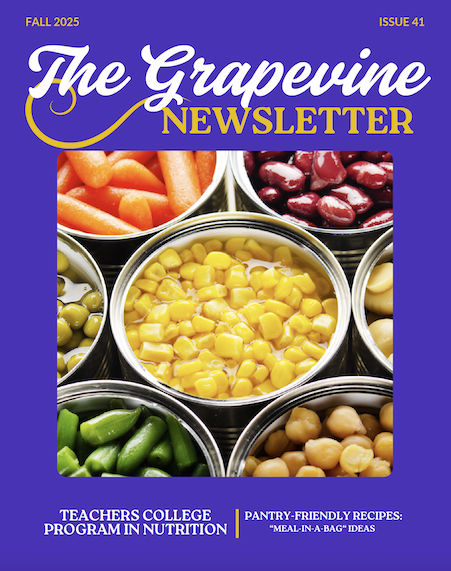
Download Fall 2025 Grapevine Issue
Dear Students, Faculty, Alumni, and Staff,
Welcome to the fall issue of the Grapevine! As the weather turns colder, we are glad to introduce articles from our fellow classmates as the start of a new academic year begins. Inside this issue you will find seasonal delights and catch up with what our students have been doing over the semester! Our writers also share different actions dietitians can take to advocate for important causes and strategies to better serve patients and clients. Hopefully everyone has been having a good year so far and will continue to do so during the holiday season. Warm wishes!

Summer 2025
The Grapevine
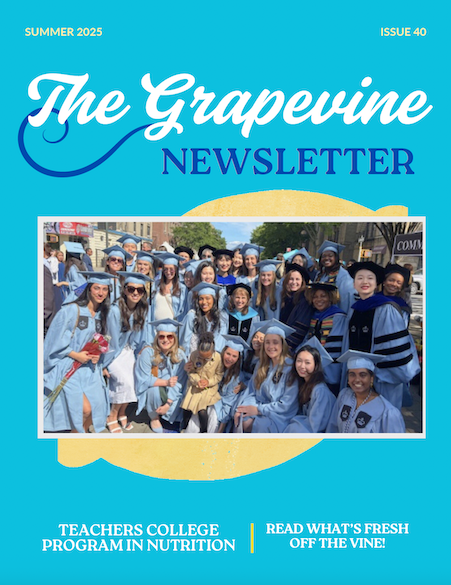
Download Grapevine Summer 2025 Issue
Dear Students, Faculty, Alumni, and Staff,
We hope everyone had a fulfilling and relaxing summer! I (Sarde) had a busy and engaging start to my summer as I began taking Medical Nutrition Therapy classes while Tyra went through her last cycles of site placement rotations. It’s been exhilarating to finally apply the nutrition knowledge we’ve gained thus far to actual patient scenarios and hands-on experiences. It has also been surreal knowing we are both approaching closer and closer to becoming RDNs.
As the sun sets on summer, we are looking forward to a new academic year as we welcome Alexia Edwards, MS, RD, CDN, CNSC, as the new instructor for Food Service Operations and Management, along with a whole new cohort of students. This year, we also look forward to welcoming back several TC alumni who will be supporting our program. We are excited to have Tyffanie Ammeter, MS, RDN, CSG, CDN joining us in her new role as Assistant MS-RDN Director to support Jennifer Hildner with site placements and coordination, Oliver Gonzalez-Yoakum, MS, RDN as the new instructor for Community Nutrition, and Matthew Graziose, PHD as the the interim instructor for Analysis of Research & Current Literature while Randi Wolf is on sabbatical in Spring 2026. We're excited to highlight Alexia Edwards in this issue of The Grapevine and will be highlighting other new faculty in future issues!
In the same vein, we bid farewell to our 2025 Program in Nutrition Graduates including our co-editor Tyra who had some parting words to share with you all for her last issue:
“I have been tremendously grateful for the opportunity to be a co-editor in chief for the Grapevine during my last year at TC. It was very rewarding to collaborate closely with faculty, alumni and current students as we put these issues together.”
We are pleased to welcome Christine Cheng as our new Co-Editor in Chief who will work alongside Sarde. We have a lovely issue to share with you including several reflections on family, cultural traditions, personal health journeys, and site placement experiences. As the Summer rounds out, we hope you savor the last few days of extra sun, delicious produce, and quality time with loved ones. See you soon!
Warmly,

Spring 2025
The Grapevine
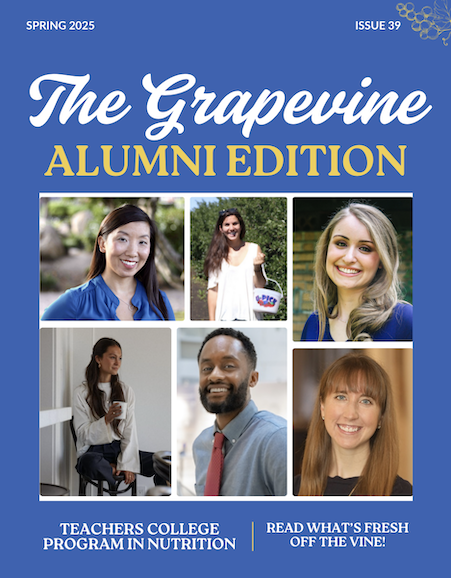
Download Grapevine Spring 2025 Issue
Dear Students, Faculty, Alumni, and Staff,
Welcome to our special ALUMNI EDITION of the Grapevine! We received an overwhelming response of willing writers for this issue, eager to connect with our esteemed alumni and gain some insight on life after TC.
It’s a delight to know that a TC education has opened up doors to a wide range of opportunities within the Nutrition and Dietetics field for our graduates. You’ll see highlights of alumni specializing in various areas like diabetes education, pediatric oncology, agroecology, holistic health, and more.
You’ll also hear from alumni who have authored their own books, been featured on podcasts, started private practices, and gone on to work in TV and media.
There’s something special to take away from every feature - whether it be a thoughtful piece of advice, a peek at their day-to-day life, or insider tips on how to prepare for the RD exam. The biggest take away for us has been the affirmation that our TC community runs deep and graduating from this program weaves a golden thread that can be tugged at any time. We thank all our writers and alumni who graciously contributed to this edition.
Warmly,

Fall/Winter 2024
The Grapevine
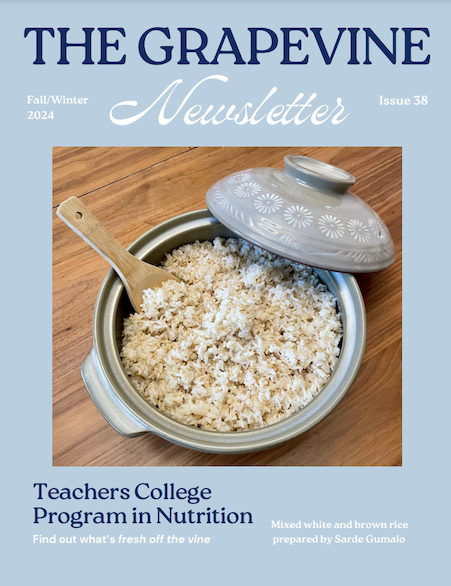
Download Fall/Winter Grapevine 2024 Issue
Dear Students, Faculty, Alumni, and Staff,
Welcome to our Fall/Winter Issue of the Grapevine! Preparing for our first edition as new co-editors has given us the wonderful opportunity to connect in a deeper way with fellow classmates and alumni. We saw firsthand how this newsletter serves as a common place to share the experiences of TC students from every point in their career path - from first-year students to graduates already working in the field.
In this issue, we delve into cultural exploration as Sacha and Shirley share about their trip to the Queens Night Market and Sarde navigates the cultural significance of rice in the context of health.
Rachel shares must-visit nearby coffee shops for studying and Kathryn discusses potential changes to Medical Nutrition Therapy that may come with the transition in presidential administration.
Tyra interviews two TC Program in Nutrition alumni who went on to other careers in the healthcare field, which includes medical school and nursing school. This highlights how a foundation in nutrition can be a stepping stone for other careers in healthcare.
Lastly we hear from second-year students, Thulasi, Naheed, Sally, and Kirsten about their site placements during the Fall semester.
Wishing you all a wonderful holiday season and a well-needed semester break. See you in January!
Warmly,

Summer/Fall 2024
The Grapevine

Download Grapevine Summer/Fall 2024 Issue
Dear Students, Faculty, Alumni, and Staff,
Welcome to the Grapevine’s Summer Issue! As our final semester as Grapevine co-editors comes to a close, we feel eternally grateful for the professors, classmates and community that has supported us through the past few years. We are excited to welcome Tyra Vanriel and Sarde Gumalo as incoming co-editors, and look forward to seeing the Grapevine thrive under their leadership!
In this issue, Christy, Tyra, Shirley, and Ziying join us to reflect on their internship experiences during years 1 and 2 of the program.
Students have also been engaged in a variety of endeavors. Jay highlights the TC CQI fair, while Sally Liu discusses her visit to the UN with Alison. In addition, Alison shares about her visit to The Museum of Food and Drink and Sophie discusses her thoughts on food critic Pete Wells’ retirement due to food-related chronic diseases.
Thank you all for the opportunity to serve as your Grapevine Co-Editors! We can’t wait to see what the future holds for our cohort!
Signing off,

Spring 2024
The Grapevine
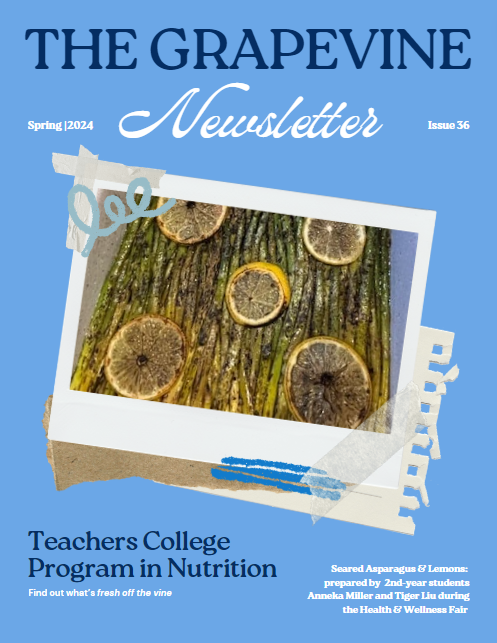
Download Grapevine Spring 2024 Issue
Dear Students, Faculty, Alumni, and Staff,
Welcome to the Grapevine’s Spring Issue! As 2024 unfolds, Program in Nutrition students have been busier than ever. Second-year students interned at a variety of locations. Wency Xiang, Tiger Liu, & Ritu Day join our co-editor Alison Garbarini to reflect on their unique experiences. In addition, our co-editors report on the success of the 2024 Health & Wellness Fair.
First-year students have also been engaged in a variety of endeavors. Sally Liu discusses her experience volunteering with the West Side Campaign against Hunger, while Tyra Vanriel shares her work teaching NYC school students as a Zankel Fellow.
Through our study of food emerges a conduit for sharing. This is exemplified through An Vo’s discussion of important cultural traditions and foods around Lunar New Year. Likewise, we hope you are inspired by Sarde Gumalo’s writings of reclaiming cultural foods, an incredibly important area to note in practicing inclusive dietetics.
From all of us at the Grapevine, we wish you a wonderful season of growth and renewal! 
Fall 2023
The Grapevine
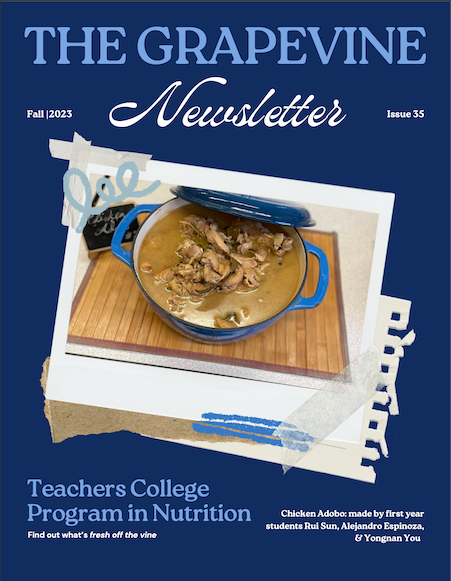
Download Grapevine Fall 2023 Issue
Dear Students, Faculty, Alumni, and Staff,
Welcome to the Grapevine’s Fall Issue! As colder temperatures approach, there are so many things for which we are grateful. In this new iteration of the Grapevine, we will explore the unparalleled opportunities we have as Program in Nutrition students.
This fall, second-year students were given the chance to intern at a variety of locations. Sheba, Jingwei, & Sophie join our co-editor Jay to reflect on their unique experiences. Likewise, we hope you are inspired by Alison & Jay’s discussions of hands-on nutrition learning. Through fall semester courses, they learned essential skills for inclusive dietetics.
Through our study of food, emerges a conduit for sharing. Wency & Ritu discuss how nutrition coursework has led them to connect with food and cultures across the globe.
Finally, learn the secrets to Tiger’s culinary prowess. Discover his Pistachio-crusted Lamb with Basil-leek puree, Pani Puri Marsala, Braised Leeks, Chanterelles, and Fried Sunchokes. You may have just found a new star dish for your Thanksgiving meal.

Summer 2023
The Grapevine
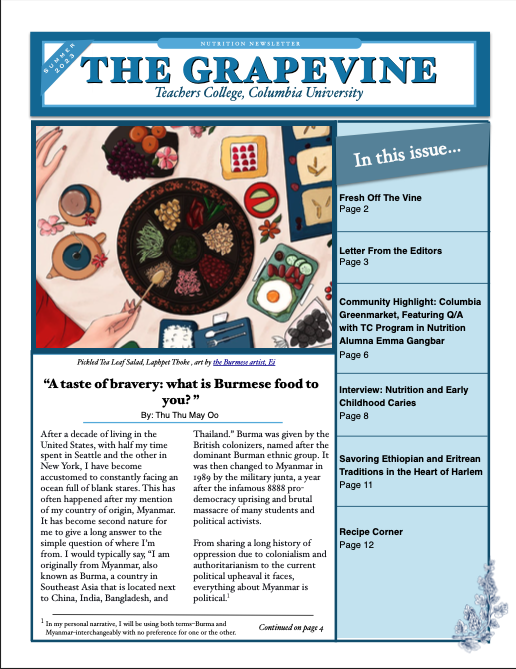
Download Grapevine Summer 2023 Issue
Dear Students, Faculty, Alumni and Staff,
Welcome to the Grapevine’s 2023 Summer Issue! We hope you are relishing the beginning of autumn as we embrace the changing season and all the beauty that comes with it.
In this issue, you will find an amalgam of creative and vibrant exploration of cultural identity and ways to build meaningful connections and communities through our dedication to our well-being and food justice. In her essay, A taste of bravery: what is Burmese food to you?, Thu Thu illustrates the ongoing civil unrest in her home country, Myanmar, while expressing her grief and hope for restorative justice for her community through her love for writing and what’s more, Burmese food.
Likewise, we hope you are inspired by Alison’s dedication to community-centered work at the Columbia Greenmarket and Wency’s intriguing interview about nutrition and early childhood carries on various ways our students and alums are sharing nutrition knowledge, tools, and resources to promote impactful behavioral interventions to children and families.
We also hope you take time to savor and nourish yourself with a diverse array of cuisines in our vibrant neighborhood, including Ethiopian and Eritrean food in the heart of Harlem. If you have not been to Masswa, we are sure you will after you read the delightful review by Jay!
As this is the final semester for Thu Thu as the co-editor, this issue of the Grapevine is more personal than the others, and we would like to center community as our theme to bring together all the beautiful stories and pieces we have woven over the past years. We are truly grateful for the connections we have made through our shared experiences at the Grapevine, and are incredibly excited to welcome our incoming editor, Jay Gendron!
Thank you for your shared knowledge and continued support to the Grapevine. We look forward to crafting many more beautiful and exciting stories with you.

Spring 2023
The Grapevine
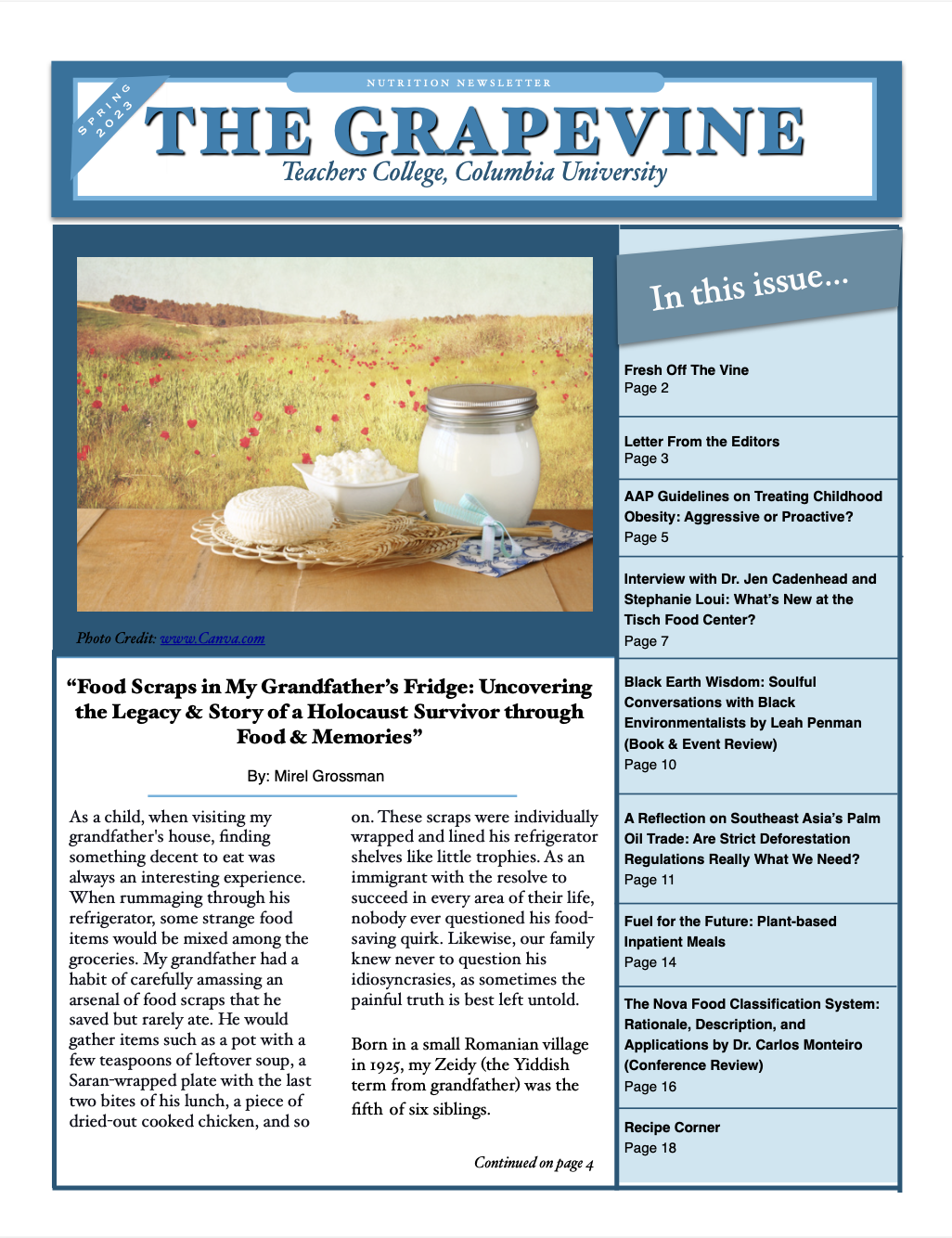
Download Grapevine Spring 2023 Issue
Dear Students, Faculty, Alumni and Staff,
Welcome to the Grapevine’s Spring Issue! As we continue to explore the important intersections between food and social justice, food policy, nutrition, and sustainability in the food systems, this issue comprises a diverse array of timely, relevant, and thought-provoking articles written by our brilliant contributors.
Mirel’s soulful personal essay, Food Scraps in My Grandfather’s Fridge: Uncovering the Legacy & Story of a Holocaust Survivor through Food & Memories, is a beautiful story that explores her cultural identity and honors the memory of her grandfather, who worked tirelessly to help provide food and a sense of purpose for his community. Her grandfather’s legacy continues to this day through Mirel’s dedication as a volunteer for Me for We, a food pantry committed to providing meals to Holocaust survivors and senior communities in New York City. This reminds us to feel and reciprocate kindness and grace as we continue to do our part in promoting food security and equity across different communities.
Throughout the issue, our contributors have explored a wide range of topics on food and health policies, including: an insightful interview with Dr. Jen Cadenhead and Stephanie Loui from the Tisch Food Center, on the important role of food advocacy, and an intriguing analysis on American Academy of Pediatrics (AAP) guidelines on treating childhood obesity by Alison. Furthermore, Jerianne’s article on plant-based inpatient meal implementations provided perspective on the nutrition and sustainability interventions happening across New York City, while Wency’s sophisticated reflection on Southeast Asia’s palm oil trade illustrated the connections between international environmental policy, environmental racism, and the livelihood of the communities in the Global South.
Last but not the least, our TC nutrition community had a fruitful year of celebration and many beautiful events organized by HealthNuts. As we enter warmer days, we hope you take the opportunity to rest and rejuvenate with our delicious recipes and feel empowered and inspired by the incredible stories of our TC community.
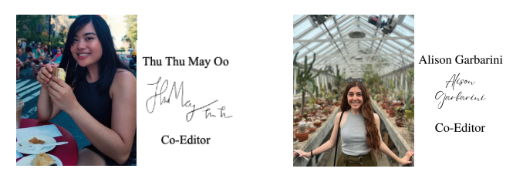
Fall 2022
The Grapevine
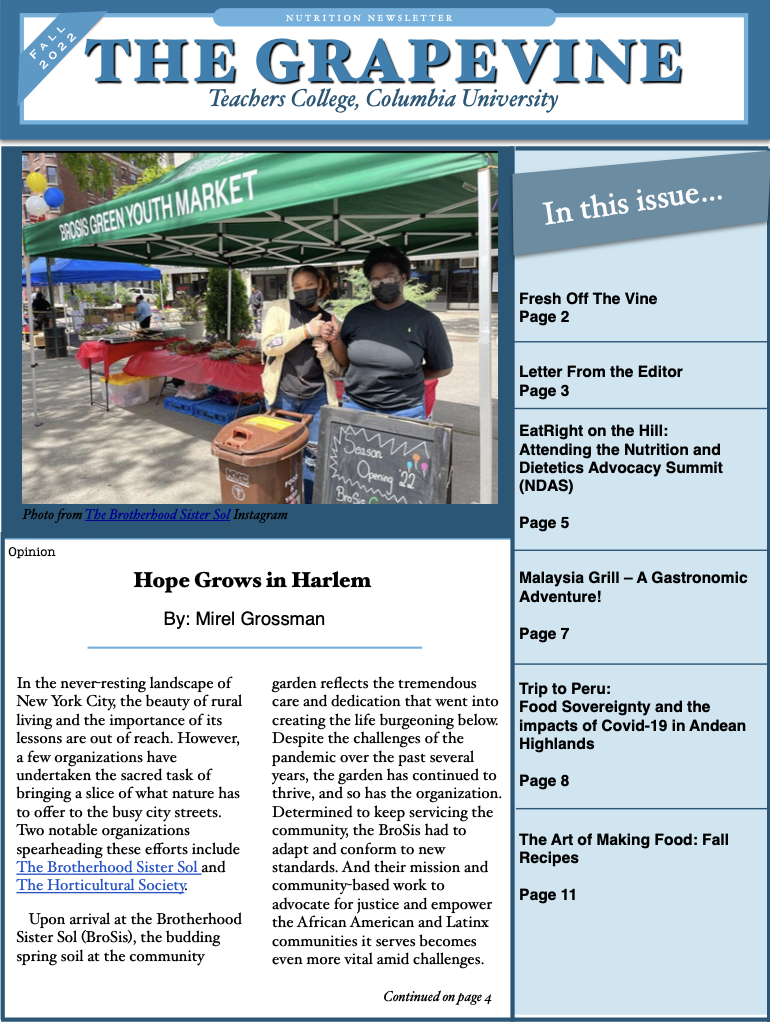
Dear Students, Faculty, Alumni and Staff,
As the fall semester comes to a close, we reflect on the challenges and achievements of 2022. Whether in our personal lives or on a larger scale, we have each strived to reach our goals this year. In keeping, this issue explores the role of advocacy in overcoming obstacles and bettering society as a whole.
In Mirel Grossman’s op-ed, Hope Grows in Harlem, we have the opportunity to learn about the organizations, the Brotherhood Sister Sol (BroSis) and the Horticultural Society, advocating for food justice, access to green spaces, and nutrition & environmental education in our local community. In fact, the New York Times recently wrote a piece about the new headquarters of the BroSis, a significant landmark for justice-centered community work in Harlem. Likewise, Jerianne Cusipag’s writing provides insight on the lack of food advocacy in other countries. She juxtaposes her experiences abroad with those at the Nutrition & Dietetics Advocacy Summit. In Emma Gangbar’s reflection of her trip to Peru, she provides us with a unique perspective on food sovereignty and her observations of the impact of Covid-19.
Throughout this issue, we discuss foods from many cultures. Katie Baird brings us on a gastronomic adventure as she explores Malaysian cuisine at a local restaurant. In the recipe corner, Oliver Gonzalez-Yoakum gives us a tantalizing taste of Pozole, a traditional Mexican stew, and Adriana Carrieri leaves us with a delectable truffle recipe (which is sure to be enjoyed by all).
As we enter 2023, we hope you take the opportunity to enjoy our recipes and join us in our resolutions for a happy and healthy new year.

Fall 2021
The Grapevine
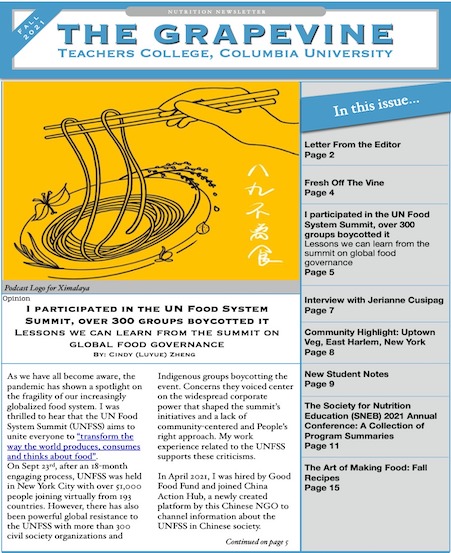
Download Grapevine Fall 2021 Issue
Dear Students, Faculty, Alumni and Staff,
What a whirlwind of a year it has been! As I am writing this letter to you, one word keeps ringing into my ears: grief. The past couple of years has been, if anything, monumental for us in many ways. We all have been grief-stricken in our way for the loss of loved ones, friendship or relationship, ecological and sociopolitical distress, or disenfranchised grief, a loss we don’t often accredit enough: the absence of social relationship or normalcy, disruptions to our routines, etc.
“We say depression and anxiety are conditions of the mind, while grief is a condition of the heart.” And, it indeed speaks to me because, in the moments of indescribable pain and chaos, I realized I needed to allow myself to feel it with full authenticity even though it’s easier said than done.
Ever since the February 2021 military coup in my home country, Myanmar (Burma), every day I have been feeling anxious about my family and friends’ safety and overwhelmed with the political violence and food issues back home. Unfortunately, with the recent tragic loss of my family member to state violence, things have been even more disheartening. However, amidst these crises, I realize how food signifies a sense of community, generosity, and humility we have for each other. Some of the few moments that have helped me navigate these challenging times were: having lunch and laughter with friends between classes, exploring a new vegan food place with Emma Gangbar in East Harlem which she wrote about in this issue, enriching moments at the Healthnuts events, and cooking virtually with my mom. I also found a sense of comfort in savoring Burmese chicken curry and a diverse array of flavorful dishes my friends made: bún riêu, spicy tteokbokki, braised ribs, Szechuan fish fillet, and red bean pastry. These are the moments I feel nourished and grounded.
As we witness the rise of global food insecurity, chronic illnesses, and malnutrition due to climate crises, humanitarian crises, and the ongoing Covid-19 pandemic, I realize our work and role as nutrition educators and public health professionals is more crucial now than ever. We must integrate nutrition education as a public health intervention and combat these crises. The interdependence of food justice and food sovereignty with these ecological, sociopolitical, and health disparities have shown us that communal care and community empowerment must be at the center as we navigate these changes, chaos, and uncertainties.
As a result, I want the Grapevine to be a safe and creative space for us to express our thoughts and feelings through storytelling, learning from each other’s inspirational work and dreams, and nurturing collective healing. In this issue, you will find an enriching conversation Mirel Grossman had with Jerianne Cusipag, who is the recipient of the AND Pediatric Nutrition Practice Group Diversity Scholarship. Jerianne shared her love for food and experience working as an RD in Doha. The op-ed piece, written by Cindy (Luyue) Zheng highlights the fragility of our globalized food system as she painstakingly evaluated the UN Food System Summit through the critical lens of social and food justice. Furthermore, regardless of how difficult the situation is, one thing that we are all capable of is being there for each other and being resilient. In the collection of summaries for the “2021 SNEB conference: Raising Reliance and Resilience”, you will find how nutrition educators and public health professionals from diverse disciplines are exploring and building resilience through trauma, food justice, and incorporating equity to research, policy, and practice.
Additionally, I have seen how our TC nutrition community has manifested such strength and resilience in many ways through the laughter we shared with our friends when we were back on campus or when we welcomed our first cohort of integrated MS-RDN students. This issue has some profiles of a few of these truly remarkable students. We also shared our support and love as we celebrated some long-standing professors in our program: the retirement of Dr. Isobel Contento during her final class teaching this Fall 2021, and the final semester Dr. Joan Gussow taught Nutritional Ecology. As we are all dedicating our hard work, time, and energy to creating a more just and sustainable food and nutrition system, I hope you have a moment to enjoy and appreciate the art of making food that Teresa Xu and Alison Garbarini beautifully illustrated through their favorite recipe pieces.
As I humbly share this role with you as an editor for our Grapevine Newsletter and carry the legacy of our amazing former editors, I want to thank all the incredible writers who contributed to this issue. I also want to thank all my friends and faculty who have graciously supported me with love and patience during these difficult times. I wish everyone finds sacredness in life as we nurture regenerative culture through our presence and collective healing.
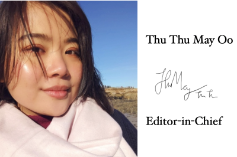
Summer 2021
The Grapevine
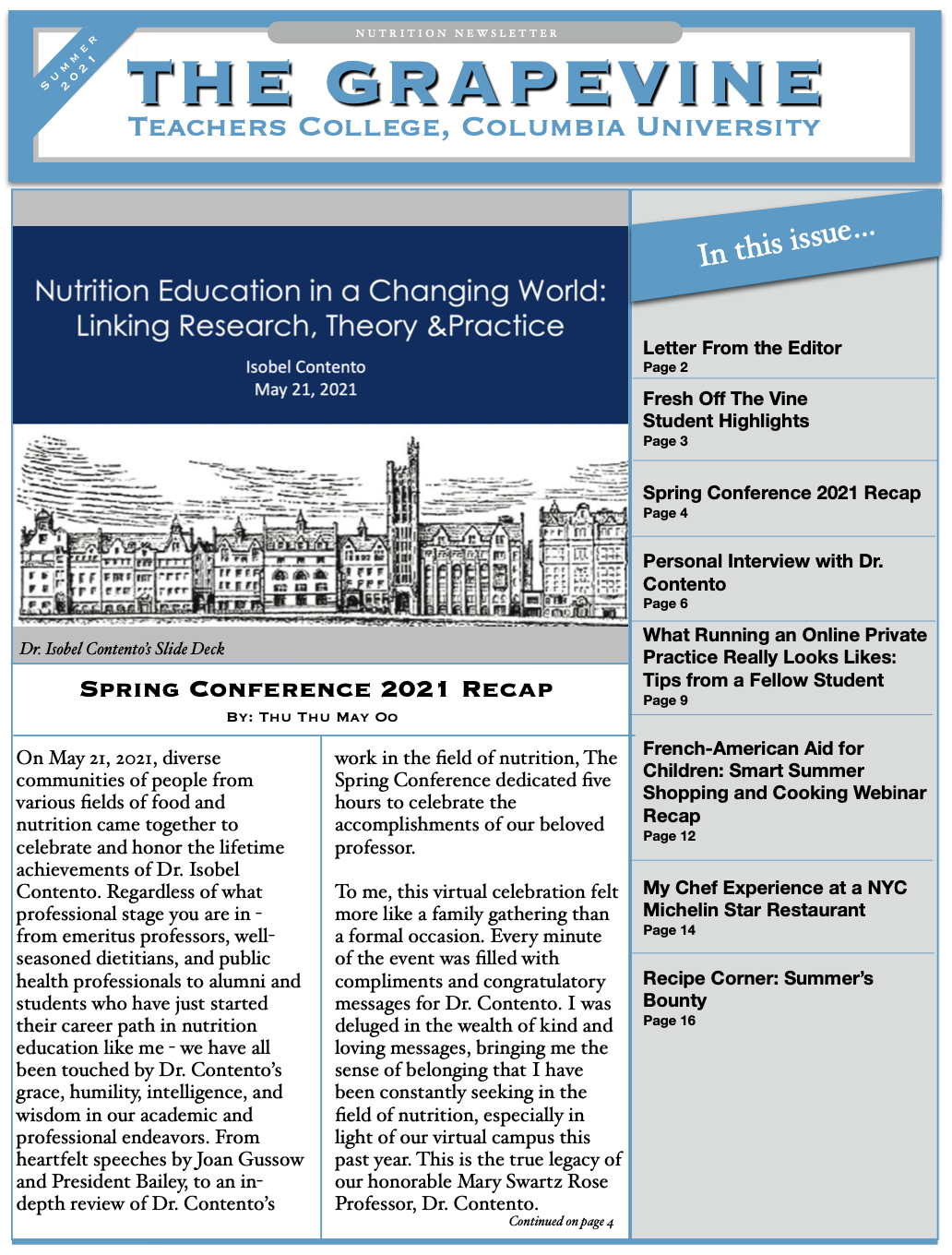
Download Summer 2021 Grapevine Issue
Dear Students, Faculty, Alumni and Staff,
This Summer 2021 edition of our program's newspaper is, first and foremost, a dedication to the Grapevine's faculty advisor, beloved professor, and pioneer in the field of nutrition, Dr. Isobel Contento.
Dr. Contento has been a part of the Teacher's College, Columbia University community for over 40 years and has served as our Mary Swartz Rose Professor for the last 22 years. While we are sad to see her leave, we relish in our privilege to have been able to learn from her throughout the years. Though Dr. Contento may be retiring this fall, her legacy, spirit, and contribution to the nutrition community will continue to impact the many generations that walk through the doors of Teachers College.
On May 21st, alumni, faculty, and students came together to celebrate the achievements of Dr. Contento at the virtual Spring Conference. For those of you who may have missed this opportunity, in this issue, Thu Thu May Oo provides a detailed recap of the inspirational conference. Katie Baird also provides a more personal interview with Dr. Contento, where you can learn about her favorite hobbies and books, as well as her predictions for the future of dietetics. This issue will also highlight a webinar where newest Mary Swartz Rose professor, colleague of Dr. Contento, and mentor to many of theTC nutrition students, Dr. Koch was a guest speaker. Outside of these wonderful articles, this edition of the Grapevine is also packed with personal pieces from our students, such as YeaJin's experience working at a Michelin star restaurant and Abbie Stasior's advice on managing and running a private practice.
As my final semester as editor of the Grapevine, and as we say our farewells to Dr. Contento, this edition was a bit bittersweet to write. However, I am excited to pass the baton down to our incoming editor Thu Thu May Oo, and embark upon a new journey at TC's dietetic internship. I thank all the incredible writers that contributed to this edition and the previous ones, and thank the TC faculty for their constant support during this strenuous year. I wish everyone a lovely rest of their summer, and I look forward to seeing what the future of the TC nutrition community holds.

Spring 2021
The Grapevine
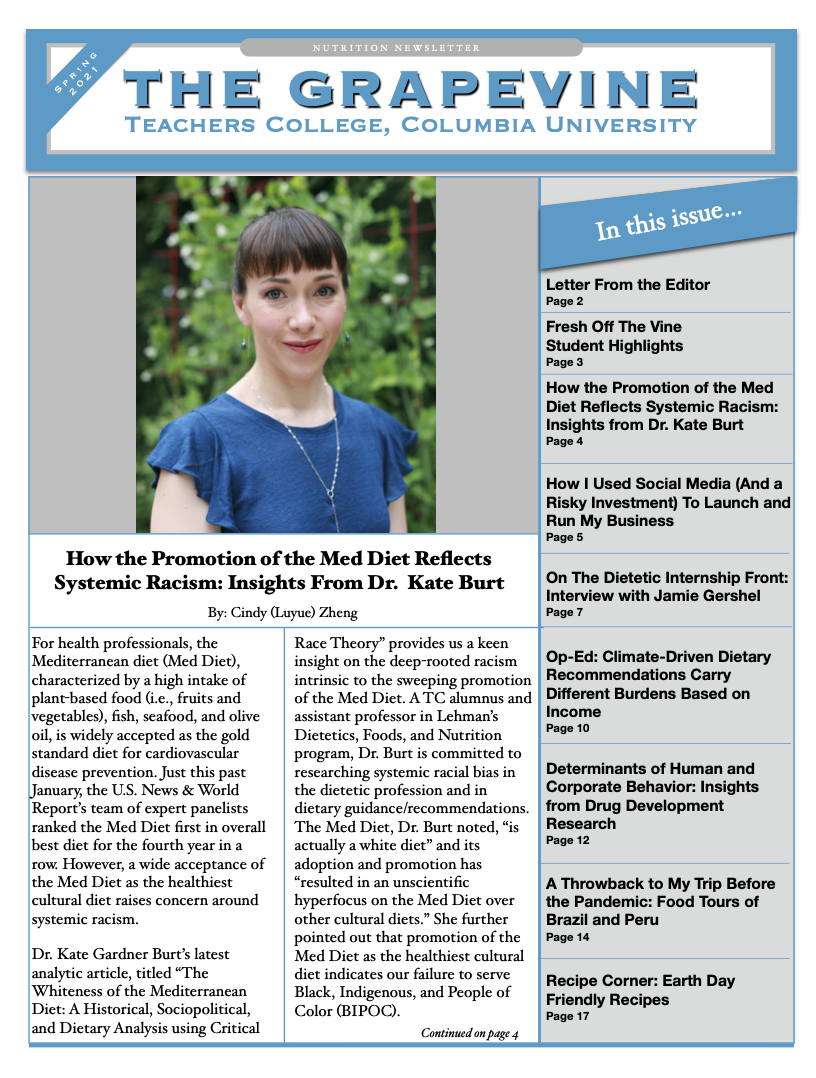
Download Grapevine Spring 2021 Issue
Dear Students, Faculty, Alumni and Staff,
We have successfully made it through another academic year during a difficult time. While we continue to face uncertainty in what lies ahead, I have continued to be inspired by the support, uplifting attitude, and open-mindedness of our peers and faculty. And as we face civil unrest in our country, I am proud to be a part of a community that celebrates differences, pushes for cultural humility, and stands for equity and social justice across the many facets of our food system.
So for this Spring 2021 edition of The Grapevine, I wanted to call on its readers to question their personal biases and role in our food system as health educators. Throughout this issue, you will find: Cindy Zheng’s summary of Dr. Kate Burt’s article on the racial biases inherent to our promotion of the Med Diet; Evan Shaulson’s connection of his research on feeding circuits in rats and the corruption that occurs at the corporate level; and my piece calling on those of higher income to take on the burden of responsibility of climate change through dietary choices. While this issue is filled with articles highlighting some of the problems that occur across various steps of our food system and nutrition education, I still hope it leaves you uplifted. We have intertwined pieces that highlight the individual differences of our peers and offer them support in their accolades. Abigail Stasior opens up about the path to her successful business venture, offering tips to her peers along the way for how to maximize social media; TC dietetic intern, Jamie Gershel, provides reflection and advice for upcoming DI students; and Jiakun Yi discusses his cultural food experience in Peru and Brazil, tying it to the influence of Asian culture in these countries. This issue of The Grapevineis more personal than others, often calling on its writers, and thus our peers, to discuss their experiences and takeaways as nutrition students. And, in turn, I hope we can take the time to celebrate the diverse backgrounds, schools of thought, and paths in our community that come through in this edition.
I want to thank everyone who contributed to this issue. I wish everyone a healthy and happy summer, and congratulations to those that have recently graduated. We will miss you!
Amanda Wahlstedt
Editor-in-Chief
Winter 2021
The Grapevine
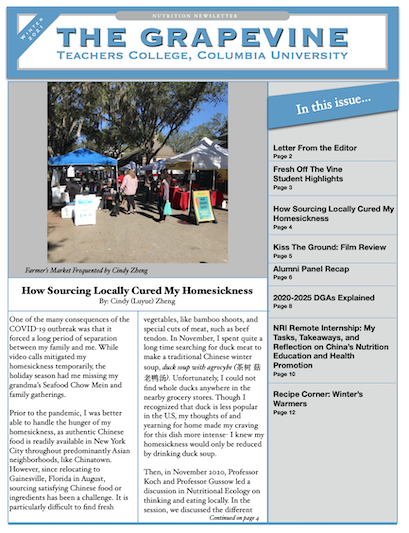
Dear Students, Faculty, Alumni and Staff,
2021 has brought with it a wave of new: a new administration; a new vaccine; a new edition of the Dietary Guidelines for Americans; a new integrated MS-RDN model at Teacher’s College Program in Nutrition; a new group of TC students applying to their dietetic internships; a new set of nutrition trends and technological advancements, be it the coining of “climitarians” or lab-grown meat. However, some facets of our pandemic world has still stayed the same: we continue to work remotely, trying to balance our work and home life; many travel bans have remained in place, separating us from our loved ones; flexibility and freedom to explore campus, experiment with exercise classes and extracurriculars, and engage in social events have remained limited; our community has continued to remain physically separated, only to be joined together by Zoom classes and webinars.
That is why for this Winter’s edition of The Grapevine, the first of 2021, I wanted to focus on our students. While traditionally jam-packed with research-driven articles, this issue is taking a different approach, focusing on our classmates and alumni’s experiences, celebrating their accomplishments, and empathizing with their struggles. As you read, I urge you to try and remember that we are a part of a larger community, one that is based on the common goal of bettering the livelihood of all through nutrition. When you read about Jiakun’s remote experience working for a major China Food Corporation, or how Cindy cured her homesickness with the help of a famers’ market, I hope you can feel their optimism and passion and that it brings out that ver y same feeling in you as well. Whether it is participating in a Health Nuts e vent, joining one of your peers’ virtual workout classes, engaging in a dialogue with Victoria on Kiss the Ground, or emailing a classmate or teacher to congratulate them on a recent accolade, I hope you find a way to connect to your Teacher's College community this winter.
I look forward to seeing how you all engage with each other, and continue to move gracefully through this unprecedented time. I want to thank everyone who contributed to this issue and I wish everyone health and safety.
Amanda Wahlstedt
Editor-in-Chief
Fall 2020
The Grapevine
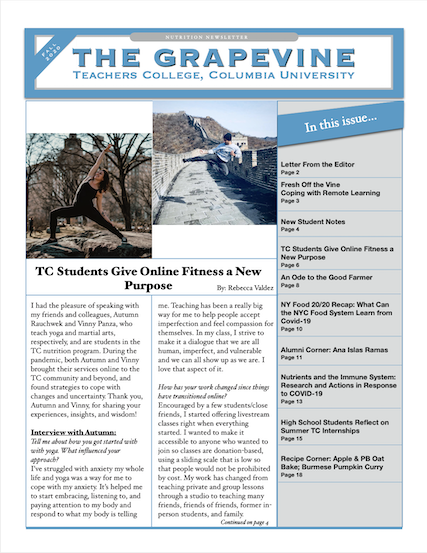
Dear Students, Faculty, Alumni and Staff,
The spring and summer 2020 semesters thrust us into a state of frenzy: we transitioned to online classes; relocated and set up our homes for quarantine; faced the plethora of COVID-19 related consequences; and felt the intensity of the social and political climate at hand. Now, well into fall of 2020 and 9 months into our pandemic way of life, I feel that we have begun to settle into our new state of normal: we have welcomed in a new year of students; we have found ways to incorporate habit and routine into stay-at-home orders; we have practiced patience with ourselves and one another; and now months without Joes as an option, we have mastered the at-home ratio of milk to coffee before our 10:00 am classes. Overwhelmingly, I feel hopeful for our future as students, health educators, and active members of our society, a feeling that is undoubtedly thanks to the student body and faculty here at TC.
As a result, I wanted this issue to highlight the strength of our community, serving a purpose to both returning and new students amidst this strange time of distant learning. Throughout these last few months, I have been awestruck by the resilience that the faculty and students have continued to display. Students like Autumn and Vinny have used their expertise in the fitness world to bring us together through Zoom. I have watched students gain a deeper appreciation for our local heroes, expanding their knowledge of their work, such as Maya did during her summer internship on a local farm. Students and faculty have continued to engage in and with webinars, lectures, and literature around the current state of food insecurity, the immune system, and other health-related implications as a result of COVID-19. And above all, I have watched us continue to support the work of one another, stay dedicated to our classes, education, preserving faculty, and desire to make the world a better place through the power of food, health, and nutrition.
As our last editor of the Grapevine, Caroline Markowitz, put it, “there is no guidebook for such a time and I have felt so lucky to be part of the TC community.” While you may have times where you feel discouraged, remind yourself that you are a part of something that extends beyond Gottessman Library or Thorndike Hall. Hopefully, in this recognition, you can gain the strength and comfort that it gives me, and put it towards your motivation to do good. While we may be apart, we continue to work and thrive together.
I want to thank everyone who contributed to this issue. I wish everyone health and safety, and I am excited for all of us to embark upon this year together.
Amanda Wahlstedt
Editor-in-Chief
Summer 2020
The Grapevine
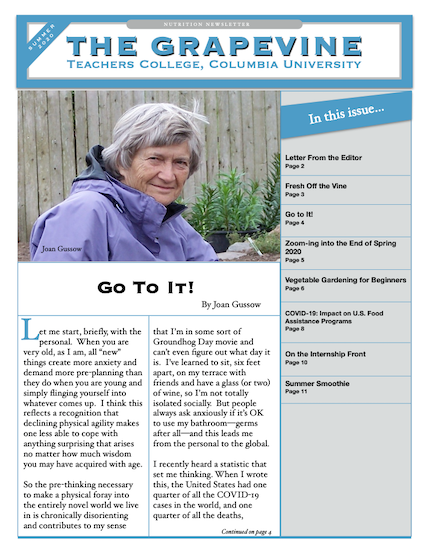
Dear Students, Faculty, Alumni and Staff,
I could have never imagined writing my last “Letter from the Editor” in the midst of a pandemic. Nor right after the U.S. Department of Homeland Security’s announcement to prohibit international students from staying in the country on an F-1 student visa at institutions conducting online learning. Fortunately, this is no longer the case!
Teachers College has taught me how to consider varying points of view when analyzing a topic or research question. Despite my many years of schooling, TC has truly taught me how to think. According to census data, 90% of Americans age 25 years and older had completed high school or higher levels of education in 2017 for the first time ever. I’m cautiously optimistic that my generation will utilize the tools we’ve learned in school to ignite change.
The TC Program in Nutrition is so special not only because of what we learn, but because of its internationally-diverse student body. Despite small class sizes, students hail from all over the world, including China, England, Guatemala, India, Mexico, New Zealand, Russia and South Africa. This enables an inclusive learning experience in which we can better understand cultures different than our own, ultimately helping us become better citizens and more culturally aware practitioners. Prior to TC, I never understood how schooling worked in China or knew that sports were mostly reserved for those with the potential to become professional athletes. I had never eaten crickets, which I did when visiting my TC friend at her home in Mexico. I never knew that some people in England use the word “mental” to describe something that’s mind-blowing. I am proud to be a member of this community that fought hard to allow its international students to remain in, and return to, NYC. For without its diverse student body, TC would be a wholly different, and dull, institution.
While I wish I were writing under happier circumstances, I pledge to do all that I can to make a difference in this world. I am so grateful for my TC experience and the amazing learning opportunities provided; more importantly, the friendships I’ve made with classmates spanning the globe. As the inspiring Joan Gussow encourages in her prolific cover article, it’s time to “Go to it!”
Sincerely,
Caroline Markowitz
Spring 2020
The Grapevine
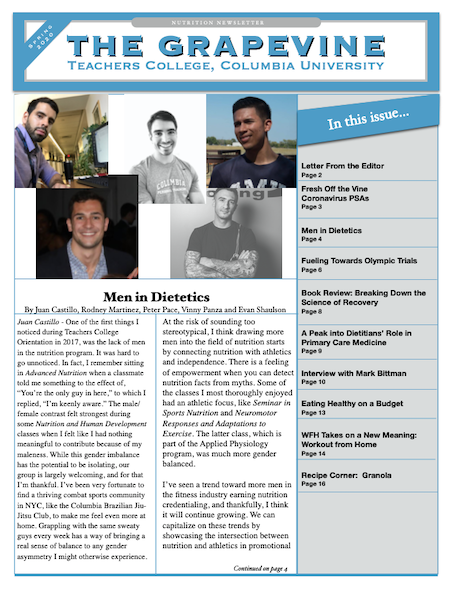
Dear Students, Faculty, Alumni and Staff,
The past few months have been unprecedented. There is no guidebook for such a time and I have felt so lucky to be part of the TC community. Despite that classes have moved online, I still feel connected to both my classmates and teachers. It’s comforting to see everyone over Zoom safe at home. When everything around us feels so unknown, dangerous and daunting, I feel a rush of relief in knowing I still have my classes and a degree to work towards.
While this Spring issue does include advice for living during coronavirus, it’s not the central focus. Prior to this pandemic, I thought a lot about how the field of nutrition and dietetics is so female dominated. Historically, women as a whole have been more concerned about their diets and body image than men. However, climate change and social media are strongly impacting the way we eat. Healthy eating now transcends genders, but it’s still so unattainable for most of the population.
In a class of 30 students in TC’s Program in Nutrition, only a few are male (all of whom are in the NEP program). I imagine this to be lonely and sometimes confusing; perhaps it begs the question, “can I be a dietitian if I’m a man?” Of course, the answer is yes. But if in their shoes, I know that’s how I would feel. I wanted to learn more about the men in TC’s Program in Nutrition. To learn how it feels to be in a female-dominated field, what inspired their passion for dietetics and how they think the field can draw in more men. I had the honor of interviewing Mark Bittman over the phone; I found it fitting to feature him in this issue. While not a dietitian, Bittman is currently Special Advisor on Food Policy at Columbia University’s Mailman School of Public Health, where he teaches and hosts a lecture series. His writing has helped reveal the connection between food and agriculture, and climate change.
I want to thank everyone who contributed to this issue. I hope that this provides a nice respite from the current state of affairs. I wish everyone health and safety, and look forward to the day when we can sit down in class together again.
Sincerely,
Caroline Markowitz
Winter 2020
The Grapevine
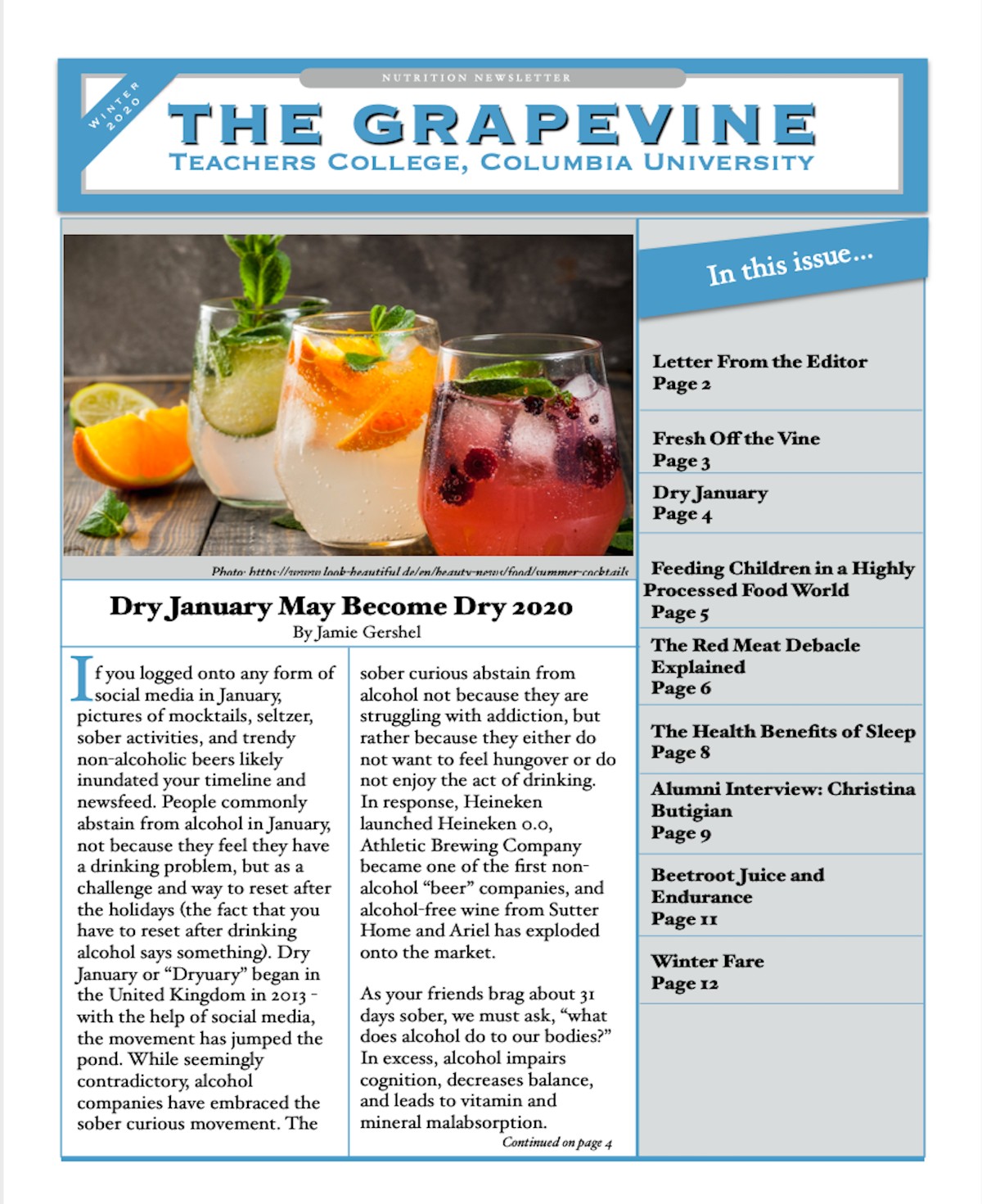
Dear Students, Faculty, Alumni, and Staff,
Nutrition research often relies on self-reporting and recall. Although observational studies attempt to reduce or eliminate bias and confounding factors, distinguishing causation from correlation, and extrapolating from the study sample to the general population remain problematic. These, along with financial sponsorship by industry, are some of the factors resulting in skepticism about the findings from nutrition research. Red meat consumption once was bad for us; now it’s good. Alcohol is an antioxidant! No, it’s a carcinogen!
In Analysis of Current Literature, Dr. Wolf teaches nutrition students to understand and critically analyze nutrition studies and how they are reported in the lay press. Students learn to sift through the facts and figures, make sense of data, find what is reported accurately and inaccurately, which conclusions are valid and generalizable, and which are not. We also learn to write our own news briefs in a way that engages the reader while correctly representing a study’s findings and limitations. Most importantly, we learn how to question study design, data, and interpretation, and to form our own opinions based on independent assessment.
This Winter’s issue, the first of 2020, focuses on some of nutrition’s hot topics. As you read, take note of the controversy. As more people understand and appreciate the importance of nutrition to health and well-being, the greater the interest in nutrition research. This creates an opportunity and responsibility. I look forward to seeing my classmate’s names atop many influential studies!
Sincerely,
Caroline Markowitz
Fall 2019
The Grapevine
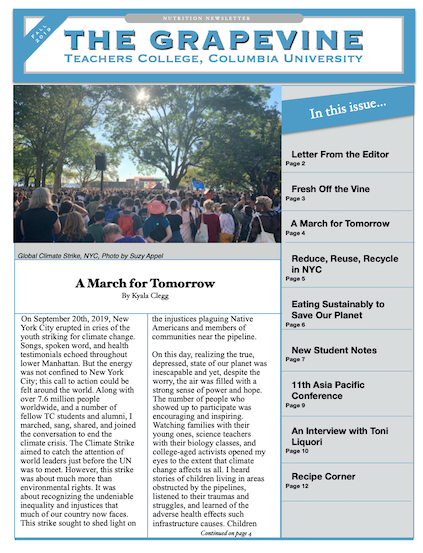
Download Grapevine Fall 2019 Issue
Dear Students, Faculty, Alumni and Staff,
With climate change playing such a central role in today’s media, I found it fitting to base this Fall’s Grapevine on sustainability as it relates to food, nutrition and living in NYC. The field of nutrition is so interconnected with the environment; we rely on Earth for her nutritious fruits and vegetables, and she on us for optimal growth and sustenance. In explaining the TC Program in Nutrition’s broad approach, our professors emphasize its focus on food from the farm to the fat cell. We are taught the importance of consuming whole foods like fruits, vegetables, grains, legumes, lean meat and fish; as regulations protecting our planet become eradicated, focusing on plant- and whole-food-based diets become increasingly vital. Trees burn in the Amazon to clear land for cattle and soybean growth. Cattle are so over-bred that if cows were a country, they would be the 3rd largest greenhouse gas contributors behind the US and China.1
While much of the data on climate change is saddening, I hope that this issue provides you with the tools and confidence you need to make a change. And most importantly, optimism. As Margaret Mead said, “Never doubt that small group of thoughtful, committed citizens can change the world; indeed, it’s the only thing that ever has.” I’m excited to share this issue with you, my first as editor-in-chief, and applaud all writers for their fabulous work. I would also like to extend a warm welcome to the new students who began this Fall - you can read more about them in “New Student Notes."
Sincerely,
Caroline Markowitz
Editor-in-Chief
1. Safran Foer, Jonathan. We are the Weather: Saving the Planet Begins at Breakfast. Farrar, Straus and Giroux, 2019.
Summer 2019
The Grapevine
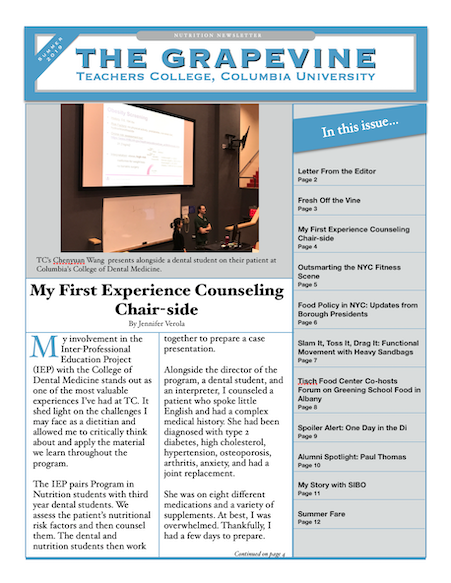
Download The Grapevine Summer 2019 Issue
Dear Students, Faculty, Alumni and Staff,
In January, I was in Vermont skiing with some friends when we encountered some powdery snow and my skis got stuck. My body went one way, my knee the other. When we got back to the city, I rested for a few weeks while the swelling went down. This was really hard for me. I walk everywhere, rock climb, run, and practice yoga. I also live on the 5th floor of a walk-up!
I didn’t know my diagnosis yet (turned out to be a partially torn ACL), so I was afraid to do anything that might make it worse. My physical activity consisted of walking only when absolutely necessary and down the stairs to my apartment. I’ll be honest, I was worried that I would gain weight. My body was strong from months of climbing and I thought I would lose all of my progress.
Thankfully, I saw an athletic trainer on campus who assured me that I could do low-impact exercise. What a relief! I used the gym’s bike and elliptical, strength trained, and practiced yoga. I learned to listen to my body. When I couldn’t get into child’s pose, I found a comfortable modification. If my knee felt tired after a long walk, I rested it for the remainder of the day. When I finally went on my first run with a friend, I kept to a slower pace despite my competitiveness.
Looking back, my fear of weight gain was unnecessary. Because I listened to my body throughout this process my weight didn’t change much. I ate the amount I actually needed instead of what I was used to when I was more physically active. This made me realize the importance of Intuitive Eating and how it can apply to movement too.
I have grown to love my body and know it will change throughout my life. This experience humbled me in many ways. It showed me that while change can be frustrating and scary at times, it can also lead you to places that you never thought you would find yourself.
Sincerely,
Jasmine Hormati
Editor-in-Chief
Spring 2019
The Grapevine
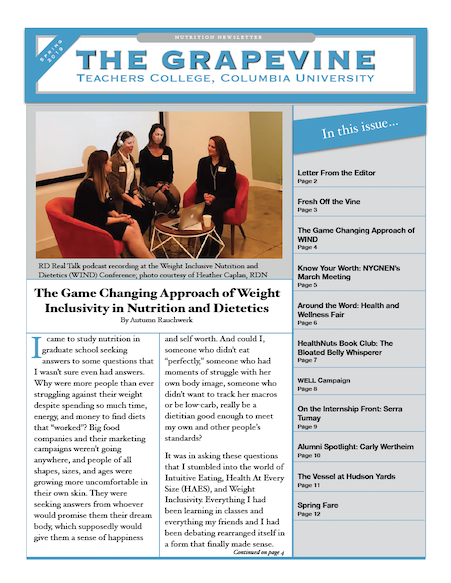
Download the Spring 2019 Issue
Dear Students, Faculty, Alumni and Staff,
When people experience GI discomfort, they usually go see a
doctor first. Sometimes they’ll get a referral to see a GI specialist
or RDN - if they’re lucky or ask. But how many of them are just
handed a script for something that will just manage their
symptoms?
At the HealthNuts’ book club (see pa ge 7 of this issue), Tamara
Duker Freuiman, MS, RD, CDN, author of the newly published,
The Bloated Belly Whisperer, talked about how many of her patients
were sent from doctor to doctor. When medications didn’t work,
the patient took it upon themselves to eliminate foods they
believed may be causing their pain or discomfort.
Restricted diets are difficult to follow and studies have shown that
they are linked to lower quality of life. Some of Tamara’s patients
used to wake up five hours early just to go the bathroom before
going into work! Others avoided social gatherings or travel
because it took them out of their routine. If only the patient had
seen a RDN who could diagnose their GI problems.
Tamara said that some of her patients spent years seeing different
doctors before coming to her as a last resort. It’s crazy to think
that a RDN would be someone’s last resort FOR A GI ISSUE. As
Tamara noted, bloating is a very vague symptom and diagnosing it
can take up a lot time. RDN’s, however, are able to spend more
time with patients. This is why we need more doctors to refer
their patients. Information from the doctor combined with RDN
can make a dia gnosis clearer.
If doctors don’t know our scope of practice, then we have to show
them how our collaboration can lead to positive health outcomes.
We need to know our worth (see Faith’s article on pa ge 5) and be
confident in our capabilities.
In a world of fad-diets and misinformation, it is imperative that
healthcare professionals work together for our patients to tr uly
feel better and live healthy, happy lives.
Sincerely,
Jasmine Hormati
Editor-in-Chief
Winter 2019
The Grapevine
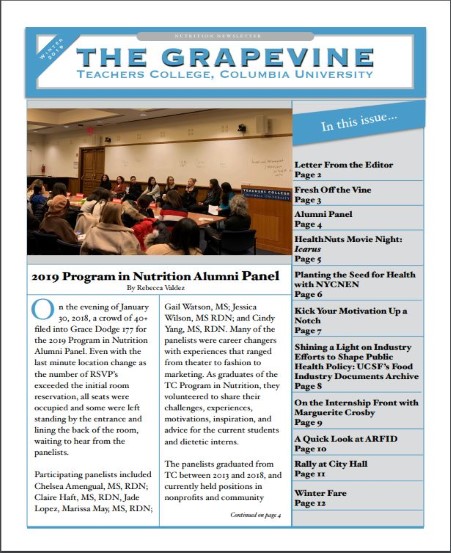
Dear Students, Faculty, Alumni and Staff,
We’ve all heard about the problems with the food system and how it
results in poor health outcomes, environmental degradation, hazardous
work conditions, and the inhumane treatment of animals. Some believe
technology is the solution. Care about animal welfare? Grow meat in a
lab. Concerned about crop diseases? Use GMO seeds and pesticides.
What if we already have other technologies that would fix our climate
crisis while simultaneously change our social structure and food system?
No patents required. According to Dr. Raj Patel, a groecology and
gender equality are the technological solutions.
On February 6th, I attended Mark Bittman’s Food Justice and Public
Health: The World That Food Made where Dr. Patel, writer, activist, and
academic, was the guest speaker. He said patriarchal societies resulted
from one invention: the plough. Historically, women did a lot of farm
work, but because the plough required great upper body strength, men
took over and the women moved inside. As the demand for food
increased, so did the need for the plough. Raj presented a study that
looked at the relationship between the use of the plough and sexism.
Countries that adopted the plough had more gender inequality
compared to those that did not.
“So who will undo the plough?”, he asked. The private sector? The
government? Dr. Patel doesn’t think so. He then described a project in
Northern Malawi where children were malnourished and funding for
agriculture was limited. It started out as agroecological experiments to
increase the diversity in food available. And it worked! The farmer
research teams were growing more food to provide a diversified diet,
but there was still another issue. Harvesting was a woman’s job in
addition to all of her other responsibilities (i.e. cooking, cleaning,
childrearing). They didn’t have time to har vest, so they turned to
another technology – teaching men to cook and organizing for gender
equality.
The result? Malnutrition in Northern Malawi declined drastically. By
teaching men to cook, the community challenged the patriarchal
society and “reinvented what it meant to be a man”1. This change was
driven by the people in the community. This is just one example of how
community organizing has resulted in positive changes for multiple
problems.
References
1. The secret ingredient for ending world hunger. (n.d.). Retrieved February 20, 2019, from
https://www.tedmed.com/talks/show?id=5299612
Sincerely,
Jasmine Hormati
Editor-in-Chief
Fall 2018
Grapevine Issue
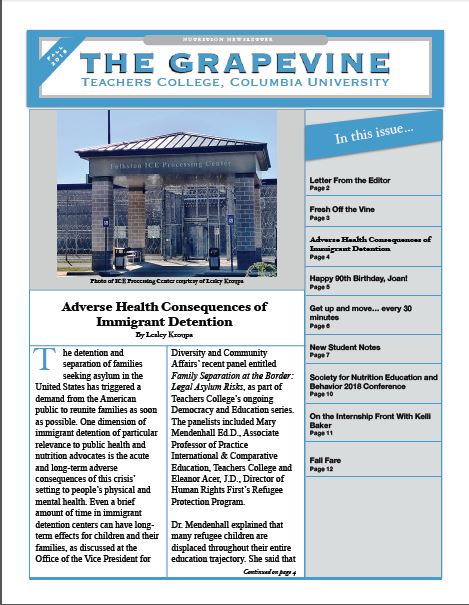
Dear Students, Faculty, Alumni and Staff, In a discussion about weight bias, I heard a comment that I haven’t been able to get off my mind. A dietitian said that people assume dietitians exercise every day, eat a healthy diet and consider us more credible if we’re thin. Body positivity is an important issue to me and I always thought I should be encouraging people to love their bodies while adopting healthy behaviors. I never thought I had to be so concerned with my own body size and its effect on me professionally. Research suggests that people have weight bias towards healthcare workers. In a study comparing patients’ attitudes towards normal, overweight or obese physicians, individuals were more likely to mistrust physicians and be less inclined to follow their medical advice if they were overweight or obese.1 While this study focused on physicians, it may apply to other clinicians as well – dietitians included. We know there are many contributing factors to weight including genetics, socioeconomic status, environmental factors and others. And thin doesn’t necessarily mean healthy. So why aren’t we changing the conversation? We should be at the forefront of Healthy At Every Size in addition to being health promoters. Other studies have shown that when healthcare providers model healthy behaviors, patients may be more motivated to adopt them.2 If we practice what we preach and encourage people to adopt healthy behaviors, why can’t we appreciate and be confident in all of our body types? The nutrition field has been criticized for not being racially diverse. But what about diversity in body types? By having a homogeneous representation, weight stigma is only reinforced and people will keep idealizing the “perfect” body image. A dietitian modeling healthy behaviors should be seen as a credible source of information regardless of what he or she looks like. I do not have a “perfect” body and I most certainly do not have a “perfect” diet. I enjoy pizza and burgers just as much as salads and plant-based proteins. I enjoy lifting weights and rock climbing just as much as lounging around watching Netflix. I’m not saying we should promote unhealthy behaviors, but we also shouldn’t hide the fact that we like French fries too. People tend to feel more comfortable around those with whom they relate. Are we really gaining their trust if we put up this idealistic front? We should lead healthy, balanced lifestyles and move towards body positivity.
Sincerely, Jasmine Hormati Editor-in-Chief
Summer 2018
The Grapevine
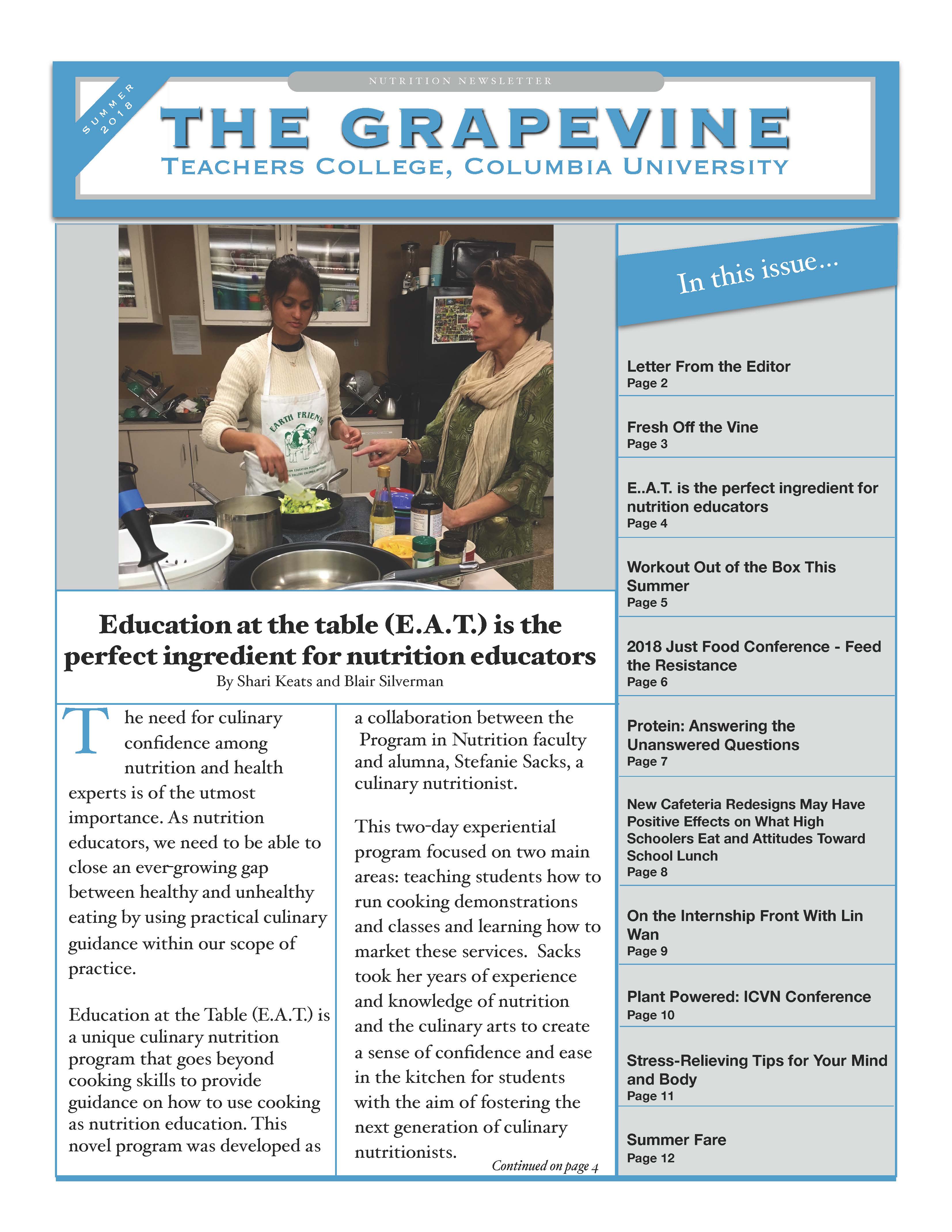
Download the Summer 2018 - Newsletter.
Summertime and the livin’ is easy… or so I thought! It’s officially stone fruit season, a.k.a. my favorite fruit season. Peaches, nectarines, apricots, plums, cherries, raspberries, strawberries, blackberries (they have small stones)… the list goes on and on. There’s just so much to choose from and so little time to enjoy them all.
Born and raised in California, I grew up having access to these fruits throughout the year. Transplanting across the country, I was not only forced to brave the elements, but I also had to adjust my eating habits. While I knew about the seasonality of crops prior to moving, I had never been forced to actually follow nature’s rules. Since moving to New York, however, I’ve definitely been made aware that I will not find a peach until summer or a blood orange until winter.
In New York, I’ve embraced more canned and frozen foods than ever before. While I’m not a huge fan of the taste of canned peaches or frozen berries, I included them in my desserts or smoothies every now and then to avoid the monotony of citrus and apples. Walking into the market the other day and seeing the first bounty of fresh nectarines and plums since moving here was more exciting than catching the B train late at night on a weekend just seconds before it leaves.
Having access to these fresh fruits again made me realize how fortunate I have been to not only be able to afford some of the most delicious treats nature has to offer, but also to find them at my neighborhood market. There are so many people who don’t have access to fresh fruit in any season. This makes me more appreciative for the foods I have access to and renews my motivation to help promote an equitable food system where everyone can also enjoy fresh fruits and vegetables. As we continue to enjoy the season’s abundance, it’s essential to keep in mind those who face more challenges to do so and take action to make sure they never have to again.
The Grapevine is written by the students in the Teachers College Program in Nutrition. I encourage all of you to get involved. Send your ideas to me at jh3856@tc.columbia.edu. Thanks to all of the students who volunteered to write for this issue!
Sincerely,
Jasmine Hormati
Editor-in-Chief
Spring 2018
The Grapevine
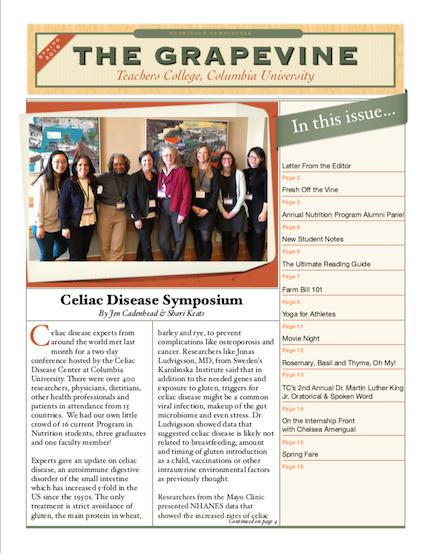
Download Spring 2018 Grapevine Issue
Dear Students, Faculty, Alumni and Staff,
Happy spring everyone! This is my first issue as Editor-in-Chief of The Grapevine and I’m really excited to work with you on our newsletter! During my tenure, I’d like to build upon the hard work of all the previous editors. Given the current political climate, I encourage you all to use The Grapevine as an outlet to discuss important topics and issues – highlighting both the negatives and positives, examining your personal interests and maybe sharing a delicious recipe or two!
As I embark on this journey as editor, I can't help but be thankful for all the experiences I’ve had that has lead me to this point in my education and career. If someone would have told me that I’d be the Editor-in-Chief of our program's newsletter when I first started graduate school, I would have never believed them. But that’s the beauty of this program. From professors to colleagues, we are surrounded by some of the most hard-working and inspirational people in this field who foster a supportive and encouraging environment for us to explore our passions and the possibilities - even the ones we never imagined for ourselves.
At times we are presented with countless opportunities that are all incredible that it becomes difficult to just pick a couple. And in a field like nutrition where there are so many pieces of the puzzle that have to be put together to understand things like why socioeconomic status relates to obesity or how to treat a patient that has multiple comorbidities – it’s no wonder that we’re drawn to many aspects of this field. All of these pieces are important for seeing the bigger picture and determining the best course of action. As independent as I like to be, I know I’ll never be an expert in everything that I want to be when it comes to this field. It’s reassuring to know that there are others out there who are working towards the same goal and who I can turn to when needed.
The Grapevine is written by the students in the Teachers College Program in Nutrition. I encourage all of you to get involved. Send your ideas to me at jh3856@tc.columbia.edu. Thanks to all of the students who volunteered to write for this issue!
Sincerely,
Jasmine Hormati
Editor-In-Chief
Master’s Candidate, Nutrition & Public Health
Winter 2018
The Grapevine
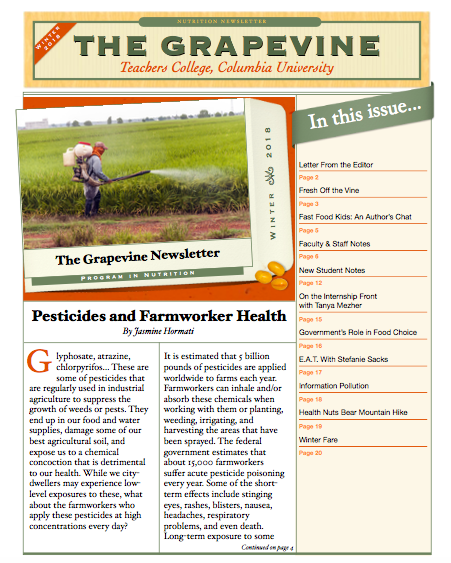
Download Winter 2018 Grapevine Newsletter
Dear Students, Faculty, Alumni, and Staff,
This is my last issue as editor, as I will be graduating this spring. I have very much enjoyed being the editor of The Grapevine for the past two and a half years. It has been a fun and educational experience, and a real pleasure getting to know many of the writers through The Grapevine. Thank you to all the writers for your hard work. I would like to officially pass the baton on to the new Grapevine editor, Jasmine Hormati. Welcome, Jasmine!
In this issue we would also like to give a warm welcome to the students who began the Program in Nutrition in the spring and fall of 2017. In New Student Notes, our new students share a little bit about their interests, backgrounds, and aspirations. Our faculty and staff also share with us what they have been up to in the Faculty & Staff Notes section.
Our feature story, written by our incoming editor, discusses the risks involved in pesticide use for farmworkers—and for the rest of us—and simple tips on what you can do to make a difference. For a peek into the dietetic internship, check out Tanya Mezher’s experience at a clinical rotation. If you haven’t made it to any of the Health Nuts events yet this year, you will want to make sure to attend the next one after reading the recaps of the hike up Bear Mountain and the book club with the book author as a special guest. Also check out our tasty recipes—pumpkin chili and apple muffins.
The Grapevine is written by the students in the Teachers College Program in Nutrition. Thanks to all of the students who volunteered to write. I encourage all of you to get involved. Send your ideas to Jasmine at jh3856@tc.columbia.edu. Thanks to all of the students who volunteered to write for this issue!
Enjoy the issue!
Julie O’Shea
Editor-In-Chief
Master’s Candidate, Nutrition Education
Summer 2017
The Grapevine
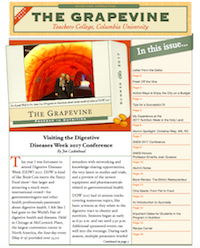
Dear Students, Faculty, Alumni, and Staff,
Each year we catch up with some of our Program in Nutrition alumni. We love hearing about the varied career paths that students take. Get a taste for life after graduate school in the Alumni Notes section and in our Alumni Spotlight, where Christina Riley tells us about her work with the USDA Food and Nutrition Service. This issue also includes a special contribution from alumna Anna Leibovici, who shares her experience at Nutrition Week 2017 in Tel Aviv, Israel.
Our cover story takes us to a conference a little closer to home, to Digestive Disease Week 2017 in Chicago. We also have a special contribution from Drs. Randi Wolf and Pam Koch about the Society for Nutrition Education and Behavior 2017 Conference, at which our own Dr. Joan Gussow was awarded the Helen Denning Ullrich Award of Excellence in Nutrition Education from the Society for Nutrition Education and Behavior (SNEB). We have reprinted an article about Joan that originally appeared on www.tc.edu.
For students about to embark on their dietetic internship, we have tips for making the most of their experiences. If you’re interested in fun, inexpensive ways to get outside and enjoy the city, we have an article for you. We also have an introduction to Ayurveda, an ancient Indian holistic healing system. Also check out our article about chia seeds, our book review of The Ethnic Restauranteur, and our delicious end-of-summer recipe.
The Grapevine is seeking an editor-in-chief starting in the spring 2018 semester. See our Fresh Off the Vine section on the following page for details.
For information about upcoming events and links to interesting nutrition-related articles, follow us on Facebook at facebook.com/TheGrapevineTeachersCollege.
Thanks to all of the students who volunteered to write for this issue! The Grapevine is written by the students in the Teachers College Program in Nutrition. I encourage all of you to get involved. Send your ideas to me at jmo2144@tc.columbia.edu.
Enjoy the issue!
Julie O’Shea
Editor-In-Chief
Master’s Candidate, Nutrition Education
facebook.com/TheGrapevineTeachersCollege
Spring 2017
The Grapevine
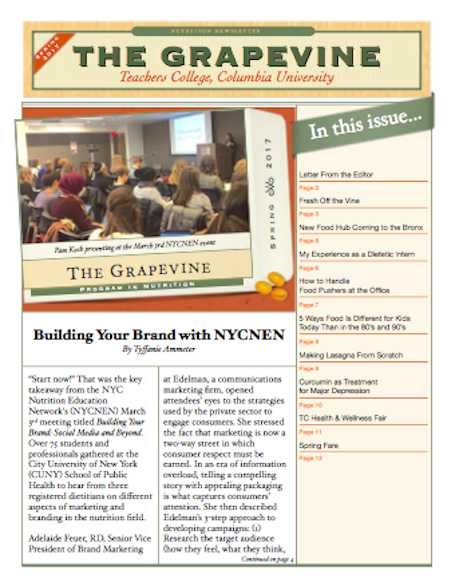
Dear Students, Faculty, Alumni, and Staff,
The Grapevine would like to congratulate the 2017 graduating class! We know how hard you’ve worked and we can’t wait to see what you do next.
Something that may help our graduates—and the rest of us—distinguish ourselves are the tips on building a brand that were presented at the March NYCNEN meeting, as shared with us by Tyffanie Ammeter. And for those embarking on the TC dietetic internship in the fall, Lela Swartz shares with us her experience from this past year.
If you haven’t heard about the new food hub coming to the Bronx, Jessica Wilson will fill you in. For fun and a few insights, Callie Troutman reflects on several ways she has observed that food is different for kids today than it was for her as a child in the 80’s and 90’s, and Faith Arnowitz shares ways to deal with coworkers who try to push food on us at work.
For those of us with a real love of cooking and a day to fill, Isabelle Carren-LeSauter shares her adventure, tips, and ricotta cheese recipe for making lasagna from scratch. For another treat, Made Qureshi shares another, quicker way to use the ricotta you make: lemon ricotta and kale toast. Also check out our article about turmeric as a potential treatment for major depression.
The Grapevine is written by students in the Teachers College Program in Nutrition. I encourage all of you to get involved. Send your ideas to me at jmo2144@tc.columbia.edu. Thanks to all of the students who contributed to this issue!
Enjoy the issue!
Julie M. O’Shea
Editor-In-Chief
Master’s Candidate, Nutrition Education
facebook.com/TheGrapevineTeachersCollege
Winter 2017
The Grapevine
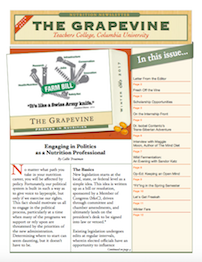
Dear Students, Faculty, Alumni, and Staff,
This semester The Grapevine is really cooking —well, at least our writers are. They have shared several delicious recipes, including gluten-f ree banana teff muffins, freekah soup, and raw peppermint brownie bite balls, and a special bonus in our online version—how to make your own sauerkraut.
In addition to our recipes, we also have interviews with TC alum Maggie Moon about her ne w book, The MIND Diet, and TC dietetic intern Peter Adintori about his clinical rotation. If you missed the fall Health Nuts “book club” event, you can still read a little bit about Dr. Isobel Contento’s trans-Siberian adventure on page 6.
Be sure to also check out our articles about campus resources to stay fit, “wild” fermentation, scholarship opportunities, and an op-ed about keeping an open mind in our ever-evolving nutrition world.
Finally, our cover story provides ideas on how navigate the world of politics in our capacity as nutritionists—a worthy endeavor in shaping our world. The Grapevine is written by students in the Teachers College Program in Nutrition. I encourage all of you to get involved. Send your ideas to me at jmo2144@tc.columbia.edu.
Thanks to all of the students who wrote for this issue!
Enjoy the issue!
Julie M. O’Shea
Editor-In-Chief
Master’s Candidate, Nutrition Education
Fall 2016
The Grapevine
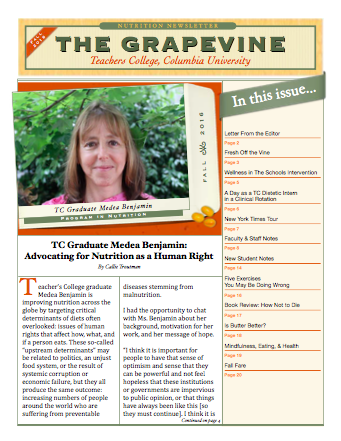
Dear Students, Faculty, Alumni, and Staff,
The results of this year’s election have been a shock to many. Though our countr y may currently seem to be divided by diametrically opposing viewpoints, I think there is more common ground than people realize. Political parties aside, we should all take this election as a call to action. It is a civic mandate bestowed on us all to create research, editorials, and articles to promote nutrition and food justice by providing others with the information and tools necessar y to lead healthy, just lives, and support candidates who encourage and promote the same ideals. It is more important than ever to find our common ground, while always standing up for what we believe in and working to make our country and world a better place for ever yone—on both sides of the aisle. I hope that you find this issue informative, and that you consider writing for the next issue about topics that you find important, fun, or interesting that need a truthful and thoughtful voice.
In this issue we would like to give a warm welcome to the students who began the Program in Nutrition in the spring and fall of 2016. In New Student Notes (p. 14), our new students share a little bit about their interests, backgrounds, and aspirations. Our faculty and staff also share with us what they have been up to (p. 8).
In our cover story, Callie Troutman profiles TC alumna Madea Benjamin, who advocates for adequate nutrition around the world. Doctoral student Priya Khorana shares with us her research through the Tisch Food Center ’s Wellness In The Schools (WITS) intervention evaluation (p. 5). For a look at a day in the life of a TC dietetic intern in a clinical rotation, check our Tyffanie Ammeter’s piece (p. 6). If you’ve ever wondered what working at a newspaper would be like, join Jen Cadenhead as she recounts her tour of The New York Times newsroom (p. 7). To check your form, read Sundus Malaikah’s article about the proper techniques for popular gym exercises (p. 16). Faith Aronowitz re views How Not to Die by Dr. Michael Gregor, and shares a few interesting nutritional tips she picked up (p. 17); Sonal Agar wal discusses the debate about butter (p. 18); and Carly Werthiem shares research about and tips for mindful eating (p. 19). No issue is complete without delicious recipes—check out page 20 for Danielle Bertiger’s Pumpkin Pie Smoothie Bowl and Carly Wertheim’s Kale Salad with Roasted Delicata Squash and Chickpea Croutons.
The Grapevine is written by the students in the Teachers College Program in Nutrition. Thanks to all of the students who volunteered to write. I encourage all of you to get involved. Send your ideas to me at jmo2144@tc.columbia.edu. Thanks to all of the students who volunteered to write for this issue!
Enjoy the issue!
Julie O’Shea
Editor-In-Chief
Master ’s Candidate, Nutrition Education
Summer 2016
The Grapevine Newsletter
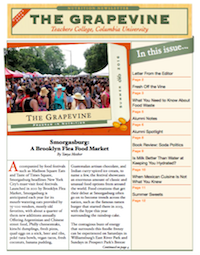
Download Summer 2016 Grapevine Issue
Dear Students, Faculty, Alumni, and Staff,
Each summer we catch up with some of our Program in Nutrition alumni. We love hearing about the varied career paths that students take. Get a taste for life after graduate school in the Alumni Notes section. This issue features alumnus Stephanie Lang, the previous editor of The Grapevine, in our alumni spotlight.
If you’re looking for something fun to do, check out our cover story about Smorgasburg, a Brooklyn “food flea market.” If you want to stay hydrated while you’re out and about, check out our article on a new hydration index to find out which beverages best keep you hydrated.
We also have articles about food waste, with ideas about how to minimize waste; a book review of Marion Nestle’s “Soda Politics,” with advocacy tips; and a new look at Mexican cuisine. And of course no issue is complete without a recipe: cool, refreshing vegan key lime pie.
For information about upcoming events and links to interesting nutrition-related articles, follow us on Facebook at facebook.com/TheGrapevineTeachersCollege.
Thanks to all of the students who volunteered to write for this issue! The Grapevine is written by the students in the Teachers College Program in Nutrition. I encourage all of you to get involved. Send your ideas to me at jmo2144@tc.columbia.edu.
Enjoy the issue!
Julie O’Shea
Editor-In-Chief
Master’s Candidate, Nutrition Education
facebook.com/TheGrapevineTeachersCollege
Spring 2016
The Grapevine Newsletter
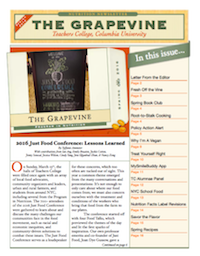
Dear Students, Faculty, Alumni, and Staff,
Now that the spring semester has ended many of us will get a nice break from classes. This issue is packed with articles for feeding your nutrition information cravings in your downtime.
Tyffanie Ammeter kicks off the issue with an information-packed article about the 2016 Just Food Conference, sharing many lessons with those who could not attend. Ian Ang gives us an in-depth look at one of the Just Food workshops about school food (page 13). On a policy note, Ali Hard gives us the latest on the Child Nutrition Reauthorization bill (page 5), which Ian also touches upon in his article.
Two articles cover TC Health Nuts’ events that you may have missed: our two newest contributors, Tanya Mezher and Isabelle Carren-Le Sauter, recap the spring book club (page 4) and the TC alumnae panel (page 11), respectively.
Gena Hamshaw shares her path to vegansim (page 9) and her Spring Soba Noodle Salad recipe (page 16). Lela Swartz also shares a recipe with us—Pesto-topped Salmon and Carrots (page 16), and the concept of root-to-stalk cooking (page 4).
There seems to be a theme of twos this issue, and Sandeep Dillion contributes to that with two articles: one about how to treat yourself right, with tips for rewarding yourself without using food (page 10), and the other about how to “savor the flavor of eating right” (page 15).
Jen Cadenhead updates us on MySmileBuddy, an app used in a pilot study at the Columbia Dental College to help families improve dental hygiene (page 11).
For a look at the new Nutrition Facts label for packaged food, check out the article on page 14.
For information about upcoming events and links to interesting nutrition-related articles, follow us on Facebook at facebook.com/TheGrapevineTeachersCollege.
The Grapevine is written by the students in the Teachers College Program in Nutrition. I encourage all of you to get involved. Send your ideas to me at jmo2144@tc.columbia.edu. Thanks to all of the students who volunteered to write for this issue!
Enjoy the issue!
Julie O’Shea
Editor-In-Chief
Master’s Candidate, Nutrition Education
facebook.com/TheGrapevineTeachersCollege
Winter 2016
The Grapevine Newsletter
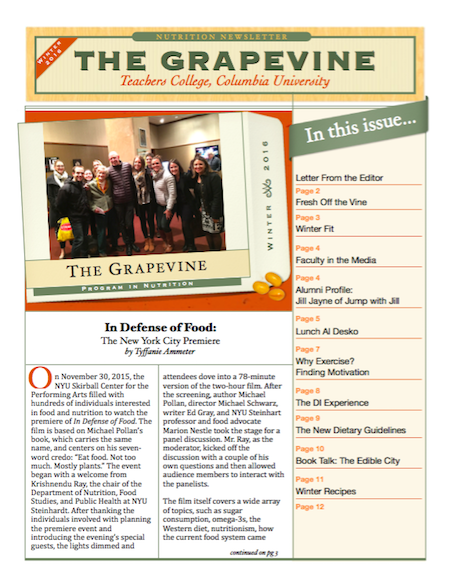
Dear Students, Faculty, Alumni, and Staff,
Happy New Year! Welcome back for the spring semester. We hope everyone enjoyed the holiday season and the winter break.
To start the semester and this issue off Tyffanie Ammeter tells those of us who couldn’t make it all about the premiere of Michael Pollan’s In Defense of Food, a documentary based on his best-selling book. Emily Braaten gives us the scoop on interesting and unique ways to work out in the city (think early morning dance parties) (page 4). Also on page 4, check out the TC faculty media presence over the past few months. Next we have an interview with alumnus Jill Jayne, creator of Jump with Jill, who created a niche in the nutrition world by combining her love of music with her love of nutrition (page 5). TC dietetic intern Casey Luber shares with us her tips for packing lunches to take along to work or school (page 7). If Emily’s article doesn't have you up and out of bed for an early morning dance party, perhaps Jen Cadenhead and Betty Tao’s interviews of fellow students will help you find your fitness motivation for the New Year (page 8). Next, Sandeep Dillon provides great insight into the world of the dietetic internship (page 9). We also have a piece briefly summing up the newly released USDA 2015-2015 Dietary Guidelines and how they have been received by the nutrition world (page 10). Ian Ang tells us about Indira Naidoo’s book talk and signing hosted by TC, in which Naidoo discussed her books The Edible City and The Edible Balcony (page 11). If you’re hungry after reading all that, check out our winter recipes: Lela Swartz’s beautiful and delicious farro with seasonal produce and goat cheese, and a sun-dried tomato dip perfect for a Super Bowl party (page 12).
For information about upcoming events and links to interesting nutrition-related articles, follow us on Facebook at facebook.com/ TheGrapevineTeachersCollege. We are looking for volunteers to help contribute to the Facebook page and to help us create a Twitter and Instagram presence. Let me know if you are interested.
The Grapevine is written by the students in the Teachers College Program in Nutrition. I encourage all of you to get involved. Send your ideas to me at jmo2144@tc.columbia.edu. Thanks to all of the students who volunteered to write for this issue!
Enjoy the issue!
Julie O’Shea
Editor-In-Chief
Master’s Candidate, Nutrition Education
facebook.com/TheGrapevineTeachersCollege
Summer 2015
The Grapevine Newsletter
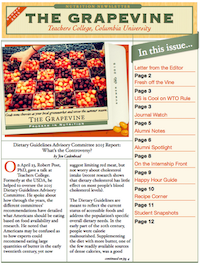
Dear Students, Faculty, Alumni, and Staff,
What a wonderful two years I have had as editor of The Grapevine. In the past two years, I started a Facebook page for the newsletter and archived pdf copies of the issue on the Program in Nutrition website. It has been a real pleasure getting to know many of the writers through The Grapevine.
This is my last issue as editor, as I will be graduating from the dietetic internship at the end of July. Starting this fall, I will be co-editor of the Greater New York Dietetic Association’s newsletter, The Greater New Yorker. I look forward to continuing my editing experience there.
I would like to officially pass the baton to the new Grapevine editor, Julie O’Shea. Welcome!
Thanks to all of the students who volunteered to write. Each summer, we catch up with some of the Program in Nutrition alumni. We love hearing about the career paths that students take after graduate school. Our alumni spotlight this issue features Pamela R. Cole, who is currently an active duty dietitian in the US Navy!
The Grapevine is written by the students in the Teachers College Program in Nutrition. Stay tuned for an announcement from Julie in the TC Nutrition News Blast regarding submissions for the fall 2015 issue.
And don’t forget to “like us” on Facebook at:
Facebook.com/TheGrapevineT eachersCollege
Special thanks to students Ian Ang and Julie O’Shea, who help find exciting stories to post on our Facebook page.
Enjoy the issue!
Winter 2015
The Grapevine Newsletter
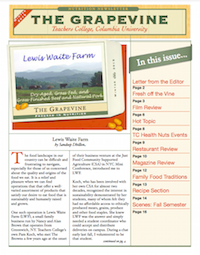
Dear Students, Faculty, Alumni, and Staff,
Why have just one? The Winter 2015 Grapevine newsletter is all about doubles. We have double film reviews (Cultivation and Food Chain$) and double restaurant reviews (Say Cheese and The Black Ant) for double the fun. With such a chilly winter break, watching movies and enjoying New York City’s restaurant scene were two of students’ favorite activities.
Matthew Graziose and I add to the “Listen Up” section of The Grapevine, which features some food and nutrition related podcasts and radio programs. For your reading pleasure, dig into Cherry Bombe, the biannual magazine celebrating women and food.
Speaking of food, Sandeep Dhillon gives us the scoop on Lewis Waite Farm, which delivers orders right to Teachers College! Jen Cadenhead brings the issue back to the hot topics of the nutrition world and focuses her piece on zero calorie sweeteners.
Tyffanie Ammeter reminds us to get social with the TC Health Nuts Events Committee, so keep your eyes peeled for fun events throughout the semester.
As we kick off 2015, Jacki Zuckerberg shares her family’s New Year’s ravioli making tradition with the Grapevine, while Natalie Rizzo gets us thinking about salads in jars. We end this issue with a recipe for Gluten-Free Minestrone Soup and a few pictures and scenes from the Fall Semester.
Special thanks to Julie O’Shea for her help editing, and to Julie, Kelli Baker and Ian Ang for their contributions to the Grapevine’s Facebook page.
The Grapevine is written by the students in the Teachers College Program in Nutrition. Thank you to all who contributed to this issue. I encourage all of you to get involved. Send your ideas to me at sal2182@tc.columbia.edu.
“Like us” on Facebook at
www.Facebook.com/TheGrapevineTeachersCo11ege
Enjoy the issue!
Stephanie Lang
Editor-In-Chief
Nutrition Education
Spring 2015
The Grapevine Newsletter
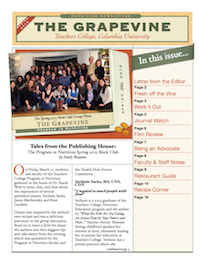
Dear Students, Faculty, Alumni, and Staff,
We are nearing the end of the spring semester. Some students are graduating this May (myself included), many students heard back from dietetic internship programs, and others are looking ahead to summer classes and summer plans.
The spring season can be fleeting, so let’s take our noses out from the books and breathe in some fresh (and warm) air! Heading to the greenmarket to pick up seasonal spring produce? Keep our Recipe Corner in mind. The recipes in this issue are full of bright and colorful meals, from a simple black-eyed pea salad to a vibrant beet and green garlic pasta. And, if you have not already hopped on the toast trend, check out the special avocado toast guide to New York City, and learn how to make your own top- notch toast.
In this issue’s Faculty Notes section, you can read up on the latest projects and personal experiences of the Program in Nutrition faculty. We officially welcome Debbie Rosenbaum, Dietetic Internship Director, and David Bradshaw, Program Secretary, as first-timers in the Faculty & Staff Notes section. Congratulations and welcome aboard!
Thanks to all of the students who volunteered to write. There are some great articles in this issue--a film review, a journal watch, a fun self-defense workout, and a piece on becoming an advocate. Enjoy!
The Grapevine is written by the students in the Teachers Co11ege Program in Nutrition. I encourage a# of you to get involved. Send your ideas to me at sal2182@tc.columbia.edu.
And don’t forget to “like us” on Facebook at
Facebook.com/TheGrapevineT eachersColl ege
Special thanks to Julie O’Shea and Ian Ang for their help creating posts for the Facebook page.
Enjoy the issue!
Stephanie Lang
Editor-In-Chief
Master’s Candidate, Nutrition Education Dietetic Intern
Summer 2014
The Grapevine Newsletter
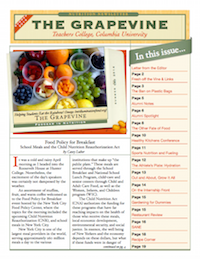
Dear Students, Faculty, Alumni, and Staff,
Summer is finally here! Every summer, The Grapevine catches up with some of the Teachers College Program in Nutrition alumni. Check out the Alumni Notes section with brief updates, and dive into the Alumni Spotlight to catch up with former students Lauren Au and Christina Riley. Alumnus Abigail Robinson drops us a note from Detroit, where she is finishing up her clinical dietetic internship.
Everyone seems to be “Out and About” this issue, from conferences near and far to farm visits, athletic events, and at- home gardening experimentations. Casey Luber catches us up on all things policy with an update on the Child Nutrition Reauthorization Act and New York City school meals.
It’s hot outside, and Lindsay Smith reminds us all to stay hydrated when we exercise this summer. In her restaurant review,
Jessica Laifer gives us the scoop on the east village’s Dirt Candy. This issue’s recipe section is all about keeping it cool with Jacki’s No-Cook Watermelon Tabouleh Salad and Jeanne’s Piña Colada Pops.
Thanks to all of the students who volunteered to write. The Grapevine is written by the students in the Teachers College Program in Nutrition. I encourage all of you to get involved. Send your ideas to me at sal2182@tc.columbia.edu.
And don’t forget to “like us” on Facebook at
Facebook.com/TheGrapevineTeachersColl ege
Special thanks to students Ryan Renaud and Jessica Laifer, who help find exciting stories to post on our Facebook page.
Enjoy the issue!
Spring 2014
The Grapevine Newsletter
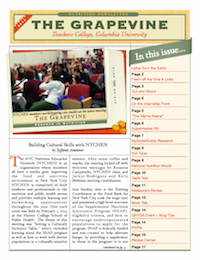
Dear Students, Faculty, Alumni, and Staff,
2014 commenced with a calendar full of exciting events. Already there has been a New York City Nutrition Education Network meeting, a Greater New York Dietetic Association conference, and a book talk and signing with Teachers College alumnus Ellie Krieger. A group of students also recently traveled to Washington, D.C. to attend the 17th Annual Health Education Advocacy Summit. Look out in the next few months for the Just Food Conference and the film screening of Growing Cities.
New to this issue is the “On the Web” section, where we feature some of the websites and blogs of current nutrition students.
March is National Nutrition Month and this year’s theme is “Enjoy the Taste of Eating Right.” Spread the message of nutrition all month long! One of the best parts about learning and working in the field of nutrition is the variety of opportunities available to us. In this edition of The Grapevine, read about a day- in-the-life of a supermarket dietitian, a prenatal yoga instructor, a childhood nutrition educator, and a nutrition research assistant working with a pediatric dental clinic.
You will need a strong gut to get through this issue’s Hot Topic on fecal transplants (told you!), but it is definitely an important read.
If you are still hungry for more, check out Ian Ang’s taste test of the fun new Blue Hill Yogurts, or head down to Xi’an Famous Foods after reading Jessica Laifer’s Restaurant Review. This issue’s recipe section will make you go crazy for cauliflower!
Thanks to all of the students who volunteered to write. This issue received an overwhelming response for interested writers! The Grapevine is written by the students in the Teachers College Program in Nutrition. I encourage all of you to get involved. Send your ideas to me at sal2182@tc.columbia.edu.
And don’t forget to “like us” on Facebook at
Facebook.com/TheGrapevineTeachersCollege
Special thanks to Ryan Renaud, dietetic intern, who has been helping find exciting stories to post on our Facebook page.
Enjoy the issue!
Stephanie Lang
Editor-In-Chief
Nutrition Education
Fall 2014
The Grapevine Newsletter
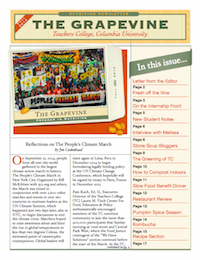
Dear Students, Faculty, Alumni, and Staff,The Fall 2014 Grapevine newsletter delves right into the roots of the food and nutrition world, from gardening and composting to climate change and food trends.
Jen Cadenhead kicks off this issue with her reflections on The People’s Climate March, which was well attended by Teachers College (TC) students, among over 400,000 others. Katie Leonard provides a quick update on the TC garden, while Sandeep Dhillon takes us into the Earth Friends Room to discuss her vermicomposting experiments. On a smaller scale, Tiffany Chag gives us a peak into her apartment gardening.
In this issue, Katrina Trisko discusses the Academy of Nutrition and Dietetics’ Stone Soup Bloggers, and I reflect on my experience at a benefit dinner for Slow Food NYC. Jacki Zuckerberg and Ian Ang take us into the world of food trends, highlighting their experiences with kombucha and the pumpkin spice latte. Plus, Jessica Laifer reviews the Lower East Side’s coolest coffee bar and luncheonette, El Rey.
New to this issue is our “Listen Up” section, which features some food and nutrition related podcasts and radio programs.
We warmly welcome some of the new students who began the Program in Nutrition this fall. The New Student Notes give everyone a glimpse of our nutrition backgrounds, interests and future pursuits.
Current dietetic intern, Natalie Rizzo, explains the application process for the dietetic internship and provides us with a look into her experience. Don’t miss Tyffanie Ammeter’s Q&A with nutrition entrepreneur, Melissa Halas-Liang.
The Grapevine is written by the students in the Teachers College Program in Nutrition. Thank you to all who contributed to this issue. I encourage all of you to get involved. Send your ideas to me at sal2182@tc.columbia.edu.
“Like us” on Facebook at
Facebook.com/TheGrapevineTeachersColl ege
Enjoy the issue!
Stephanie Lang
Editor-In-Chief
Fall 2013
The Grapevine Newsletter
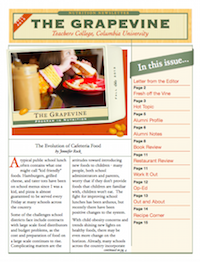
Dear Nutrition Students, Faculty, Alumni, and Staff,
I’d like to first thank everyone for their hard work, support, and help during my time as editor of The Grapevine. The Grapevine has been a great experience and it has lead to several exciting opportunities, including continuing my editing career with the Greater New York Dietetic Association.
Graduates of the Teachers College Program in Nutrition have gone on to pursue a variety of exciting careers. Get a taste for life after graduate school in the Alumni Notes section, page 8.
This issue also explores some of the hot nutrition news topics of the last few months. In this edition’s feature, you’ll learn about the first vegetarian public school in New York City. Our Hot Topic (page 5) investigates the world of cultured meat. And our Op-Ed is a creative description of the often overwhelming food industry “carnival” (page 15).
Our Work It Out section on page 12 is written by The Grapevine’s new editor, Stephanie Lang. Be sure to check out her advice on ways to stay in shape without breaking the bank, something many students can really use!
Thanks so much to all the students who have volunteered to write. The Grapevine is written by the students for the nutrition program community. I encourage all of you to get involved. Send your ideas to Stephanie Lang at sal2182@tc.columbia.edu.
Enjoy!
Jennifer Rock
Editor-In-Chief
Nutrition Education
November 2013
The Grapevine Newsletter
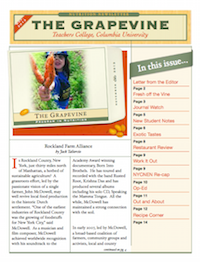
Dear Students, Faculty, Alumni, and Staff,
Happy November! This is my first official semester as Editor-in-Chief of the Grapevine Newsletter, and I am looking forward to collaborating with many of you on future issues.
In this mid-semester fall issue, we would like to give a warm welcome to some of the new students who began the Program in Nutrition both in the spring and fall of 2013 (page 6). These New Student Notes give everyone a glimpse of our nutrition backgrounds, interests and future pursuits.
In this edition’s feature, we learn about Rockland Farm Alliance and sustainable food production in Rockland County, NY.
This issue also explores some relevant research on nutrition and childhood obesity as it relates to psychosocial theory (page 5). Experience the food of Spain in our Exotic Tastes section (page 8), or zip across to Pennsylvania and check out life on a pig farm in our Out and About section (page 12). There is a re-cap of the October NYCNEN meeting held at TC (page 10), and our Op-Ed tells a story about living vibrantly despite chronic pain (page 11).
We have a Restaurant Review of Harlem’s Jin Ramen and some exciting free fitness opportunities to check out (page 9). With the fall season in full swing and the holidays approaching, this issue would not be complete without an extensive Recipe Section (page 14) full of winter squash and baked apples galore!
Thanks to all of the students who have volunteered to write. The Grapevine is written by the students in the Teachers College Program in Nutrition. I encourage all of you to get involved. Send your ideas to me at sal2182@tc.columbia.edu.
And don’t forget to “like us” on Facebook at
Facebook.com/TheGrapevineTeachersColl ege
Special thanks to Ryan Renaud, dietetic intern, who has been helping find exciting stories to post on our Facebook page.
Enjoy the issue!
Stephanie Lang
Editor-In-Chief
Nutrition Education
Dear Students, Faculty, Alumni, and Staff,
Happy New Year! Welcome back for the spring semester. We hope everyone enjoyed the holiday season and the winter break.
To start the semester and this issue off Tyffanie Ammeter tells those of us who couldn’t make it all about the premiere of Michael Pollan’s In Defense of Food, a documentary based on his best-selling book. Emily Braaten gives us the scoop on interesting and unique ways to work out in the city (think early morning dance parties) (page 4). Also on page 4, check out the TC faculty media presence over the past few months. Next we have an interview with alumnus Jill Jayne, creator of Jump with Jill, who created a niche in the nutrition world by combining her love of music with her love of nutrition (page 5). TC dietetic intern Casey Luber shares with us her tips for packing lunches to take along to work or school (page 7). If Emily’s article doesn't have you up and out of bed for an early morning dance party, perhaps Jen Cadenhead and Betty Tao’s interviews of fellow students will help you find your fitness motivation for the New Year (page 8). Next, Sandeep Dillon provides great insight into the world of the dietetic internship (page 9). We also have a piece briefly summing up the newly released USDA 2015-2015 Dietary Guidelines and how they have been received by the nutrition world (page 10). Ian Ang tells us about Indira Naidoo’s book talk and signing hosted by TC, in which Naidoo discussed her books The Edible City and The Edible Balcony (page 11). If you’re hungry after reading all that, check out our winter recipes: Lela Swartz’s beautiful and delicious farro with seasonal produce and goat cheese, and a sun-dried tomato dip perfect for a Super Bowl party (page 12).
For information about upcoming events and links to interesting nutrition-related articles, follow us on Facebook at facebook.com/ TheGrapevineTeachersCollege. We are looking for volunteers to help contribute to the Facebook page and to help us create a Twitter and Instagram presence. Let me know if you are interested.
The Grapevine is written by the students in the Teachers College Program in Nutrition. I encourage all of you to get involved. Send your ideas to me at jmo2144@tc.columbia.edu. Thanks to all of the students who volunteered to write for this issue!
Enjoy the issue!
Julie O’Shea
Editor-In-Chief
Master’s Candidate, Nutrition Education
facebook.com/TheGrapevineTeachersCollege
Dear Students, Faculty, Alumni and Staff, In a discussion about weight bias, I heard a comment that I haven’t been able to get off my mind. A dietitian said that people assume dietitians exercise every day, eat a healthy diet and consider us more credible if we’re thin. Body positivity is an important issue to me and I always thought I should be encouraging people to love their bodies while adopting healthy behaviors. I never thought I had to be so concerned with my own body size and its effect on me professionally. Research suggests that people have weight bias towards healthcare workers. In a study comparing patients’ attitudes towards normal, overweight or obese physicians, individuals were more likely to mistrust physicians and be less inclined to follow their medical advice if they were overweight or obese.1 While this study focused on physicians, it may apply to other clinicians as well – dietitians included. We know there are many contributing factors to weight including genetics, socioeconomic status, environmental factors and others. And thin doesn’t necessarily mean healthy. So why aren’t we changing the conversation? We should be at the forefront of Healthy At Every Size in addition to being health promoters. Other studies have shown that when healthcare providers model healthy behaviors, patients may be more motivated to adopt them.2 If we practice what we preach and encourage people to adopt healthy behaviors, why can’t we appreciate and be confident in all of our body types? The nutrition field has been criticized for not being racially diverse. But what about diversity in body types? By having a homogeneous representation, weight stigma is only reinforced and people will keep idealizing the “perfect” body image. A dietitian modeling healthy behaviors should be seen as a credible source of information regardless of what he or she looks like. I do not have a “perfect” body and I most certainly do not have a “perfect” diet. I enjoy pizza and burgers just as much as salads and plant-based proteins. I enjoy lifting weights and rock climbing just as much as lounging around watching Netflix. I’m not saying we should promote unhealthy behaviors, but we also shouldn’t hide the fact that we like French fries too. People tend to feel more comfortable around those with whom they relate. Are we really gaining their trust if we put up this idealistic front? We should lead healthy, balanced lifestyles and move towards body positivity.
Sincerely, Jasmine Hormati Editor-in-Chief